Progress on social mobility in the UK has been “disappointing”, the government’s own watchdog has said, after only one in four of its recommendations were delivered – despite successive prime ministers pledging to address inequality as a priority.
Theresa May vowed to tackle burning injustices when she entered Number 10 in 2016, while Boris Johnson campaigned to become prime minister on his vision to “level up” Britain.
Despite this, the Social Mobility Commission’s latest review found that 600,000 more children are now living in relative poverty than in 2012, that just one in four disadvantaged GCSE pupils get a good pass in English and maths compared with half of their better-off peers, and that life expectancy is falling for women in the most deprived areas.
Download the new Independent Premium app
Sharing the full story, not just the headlines
Children from black and minority ethnic groups are also more likely to be poor, with the rate standing at 45 per cent compared with 26 per cent of children in white British families. Half of all adults from the poorest backgrounds receive no training at all after leaving school.
The commission’s new report, based on a comprehensive audit of government action on social mobility, reveals that of the 52 proposals it has made between 2013 and 2020, only one-quarter (23 per cent) had seen strong progress made or the proposal delivered.
There was no or very little action on one-third of recommendations (31 per cent), while on almost half (46 per cent) there was some, but insufficient, progress.
The report noted that prior to the pandemic there had been some evidence of progress in increasing the life chances for poorer groups, including more disadvantaged pupils staying in education for longer and more poorer students going into higher education and employment.
But the commission also identified several areas of “major concern” where the government had failed to deliver, and said its work exposed how a “lack of joined-up thinking and activity” across Whitehall was impeding progress on social mobility.
With the coronavirus crisis already hitting poorer people harder, the watchdog said it was imperative to tackle social inequality more effectively, and called for a dedicated unit in government to coordinate action and ensure its recommendations were delivered.
The latest news on Brexit, politics and beyond direct to your inbox
Dame Martina Milburn, outgoing chair of the Social Mobility Commission, warned that the prime minister’s goal of “levelling-up” opportunity would now have to take place in the context of the major economic and social dislocation caused by Covid-19.
“Social mobility has never been more important. It is the poor and the young who will suffer most from the economic downturn,” she said.
“To succeed, action will need to be driven from the heart of government. At present there is no meaningful coordination between departments on the social mobility agenda, and no single force championing social mobility across the government.”
Shadow work and pensions minister Kate Green claimed the report exposed a government with “no interest in levelling up Britain”, adding: “It’s an appalling record of mismanagement and indifference to the life chances of working class families and their children.”
Helen Barnard, acting director of the Joseph Rowntree Foundation (JRF), said: “The coronavirus pandemic has laid bare the depth and extent of inequalities in our society. At a time when over 4 million children are trapped in poverty across our country, it is a damning indictment that so little progress has been made in improving young people’s chances.”


1/50 10 June 2020
Social distancing markers around the penguin enclosure at London Zoo. Staff have been preparing and are now ready for reopening next week with new signage, one-way trails for visitors to follow, and extra handwashing and sanitiser stations in place
PA
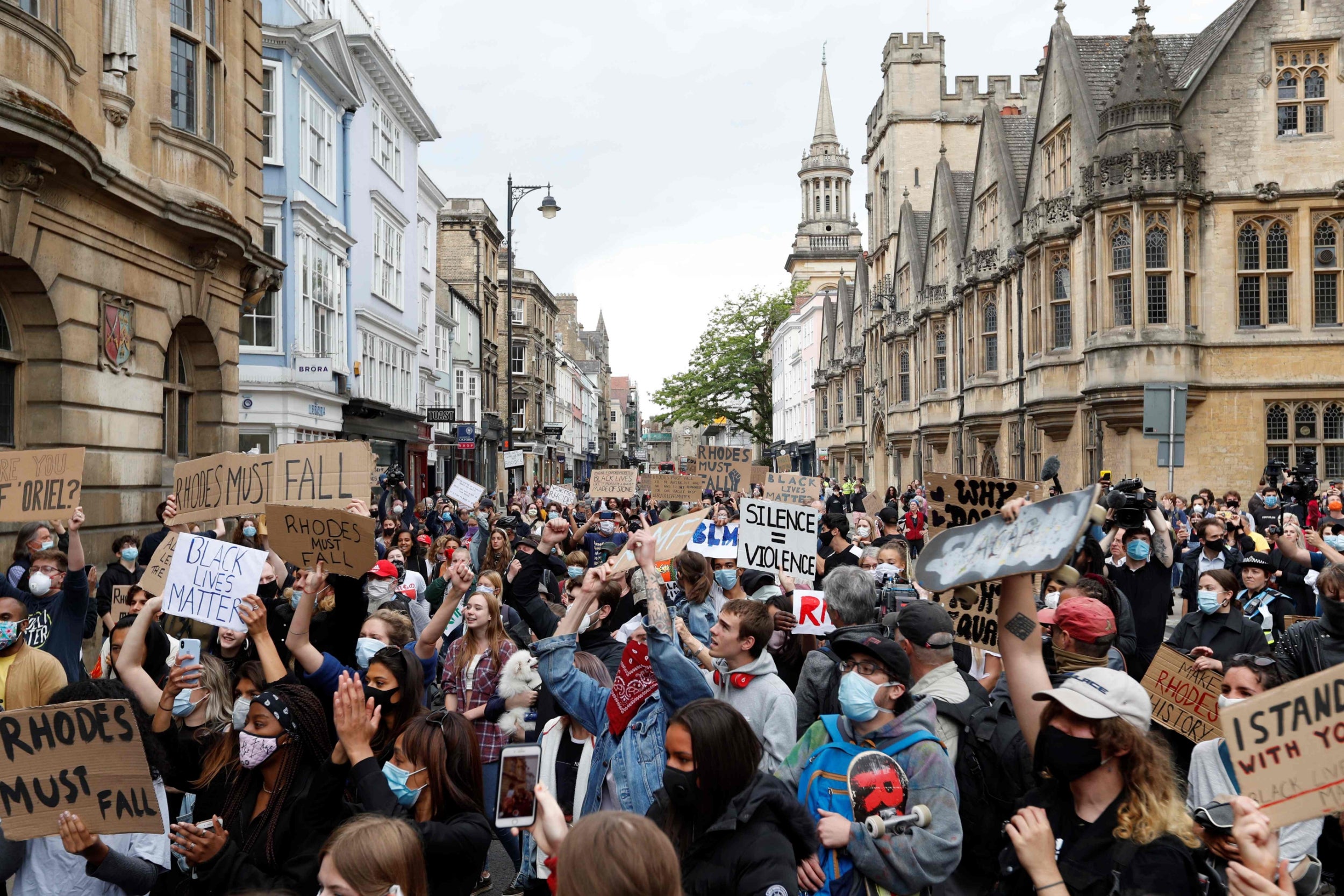
2/50 9 June 2020
Protestors hold placards and shout slogans during during a protest called by the Rhodes Must Fall campaign calling for the removal of the statue of British imperialist Cecil John Rhodes outside Oriel College, at the University of Oxford
AFP via Getty
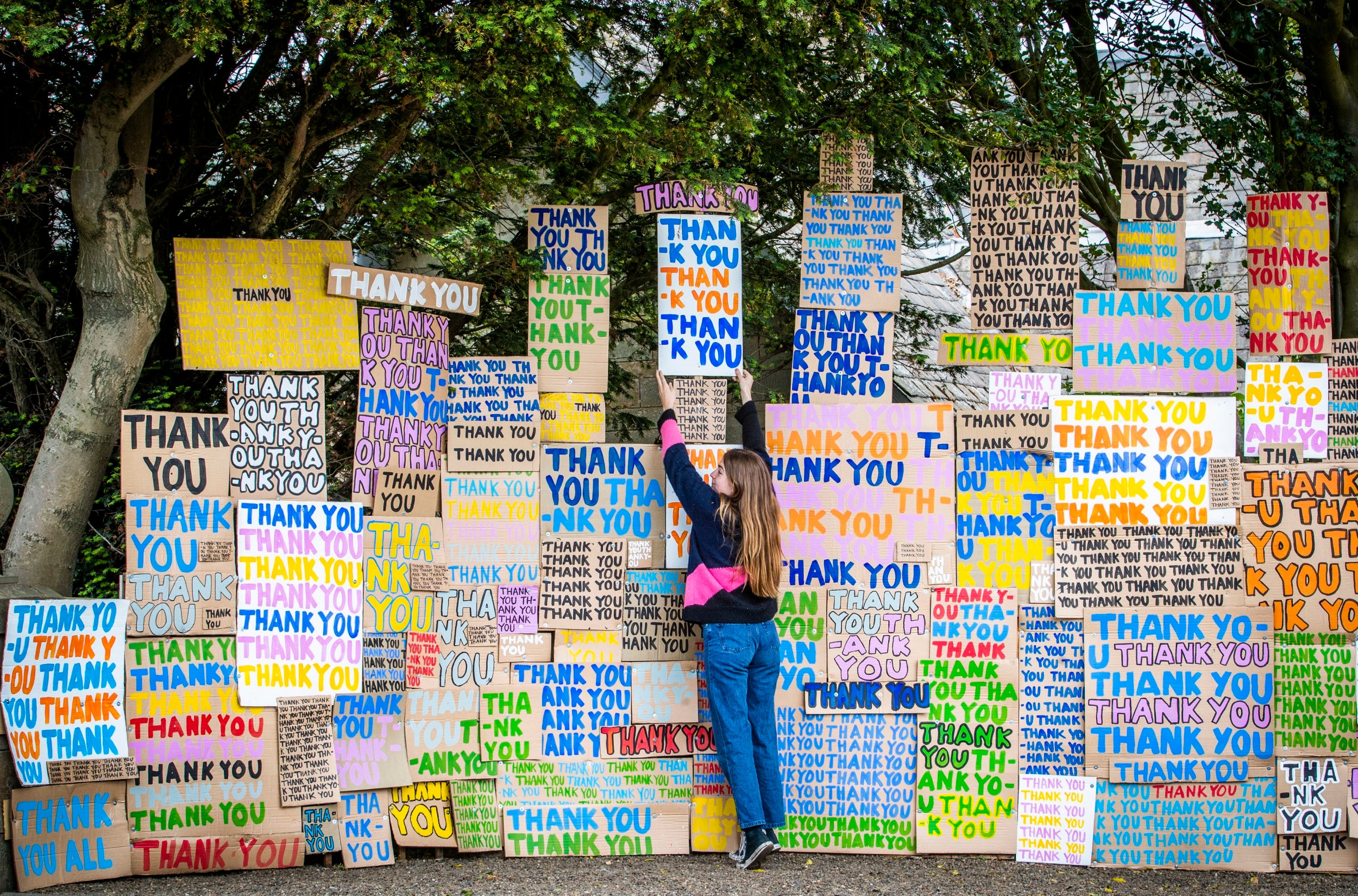
3/50 8 June 2020
Hermione Wilson helps to install a new artwork at Jupiter Artland, Edinburgh, created as a tribute to the NHS titled “A Thousand Thank Yous” originally devised by the late Allan Kaprow which consists of colourful painted messages on cardboard and has been directed remotely by London-based artist Peter Liversidge
PA
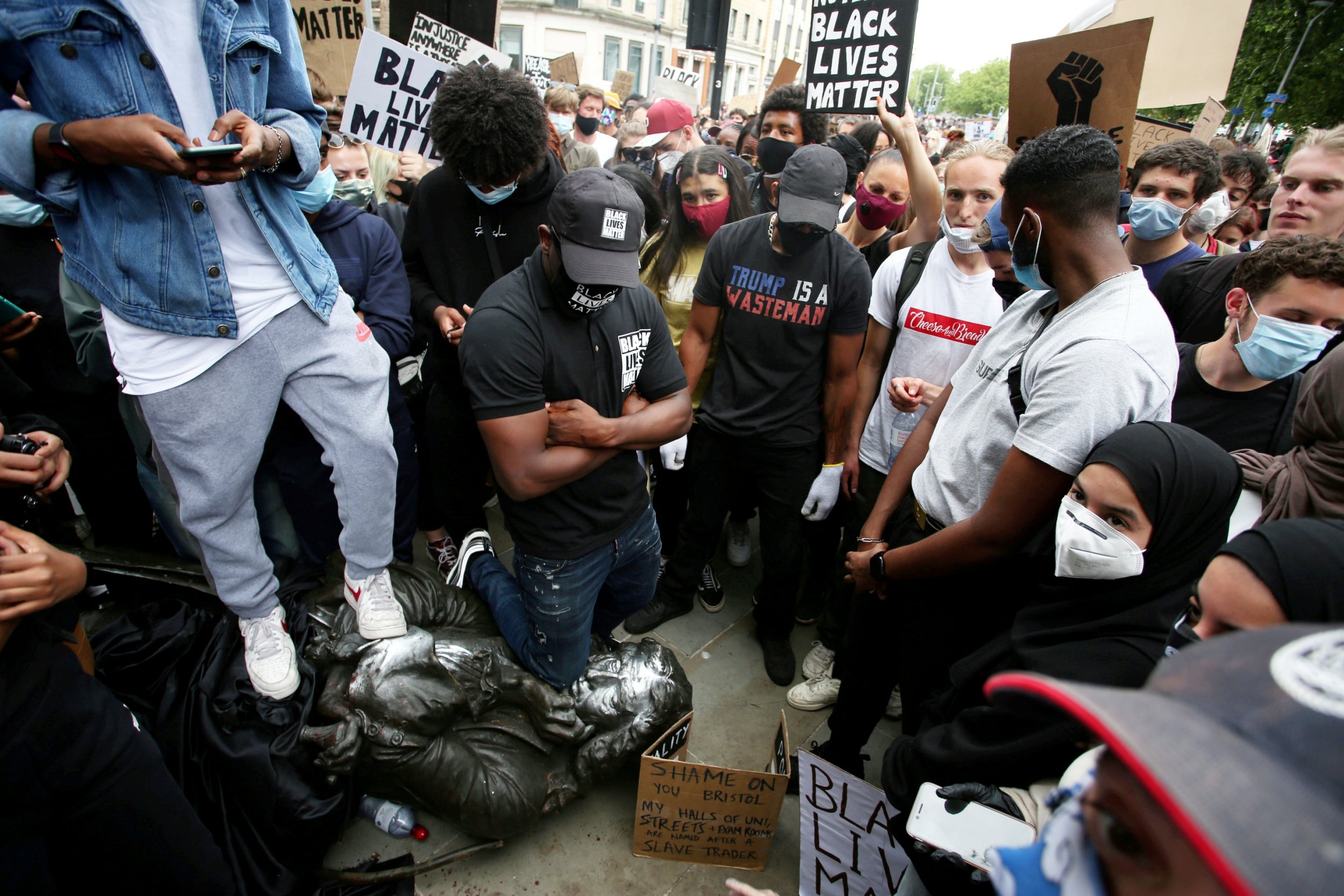
4/50 7 June 2020
The Edward Colston statue has been pulled down by Black Lives Matter protesters in Bristol. Colston was a 17th century slave trader who has numerous landmarks named after him in Bristol
SWNS
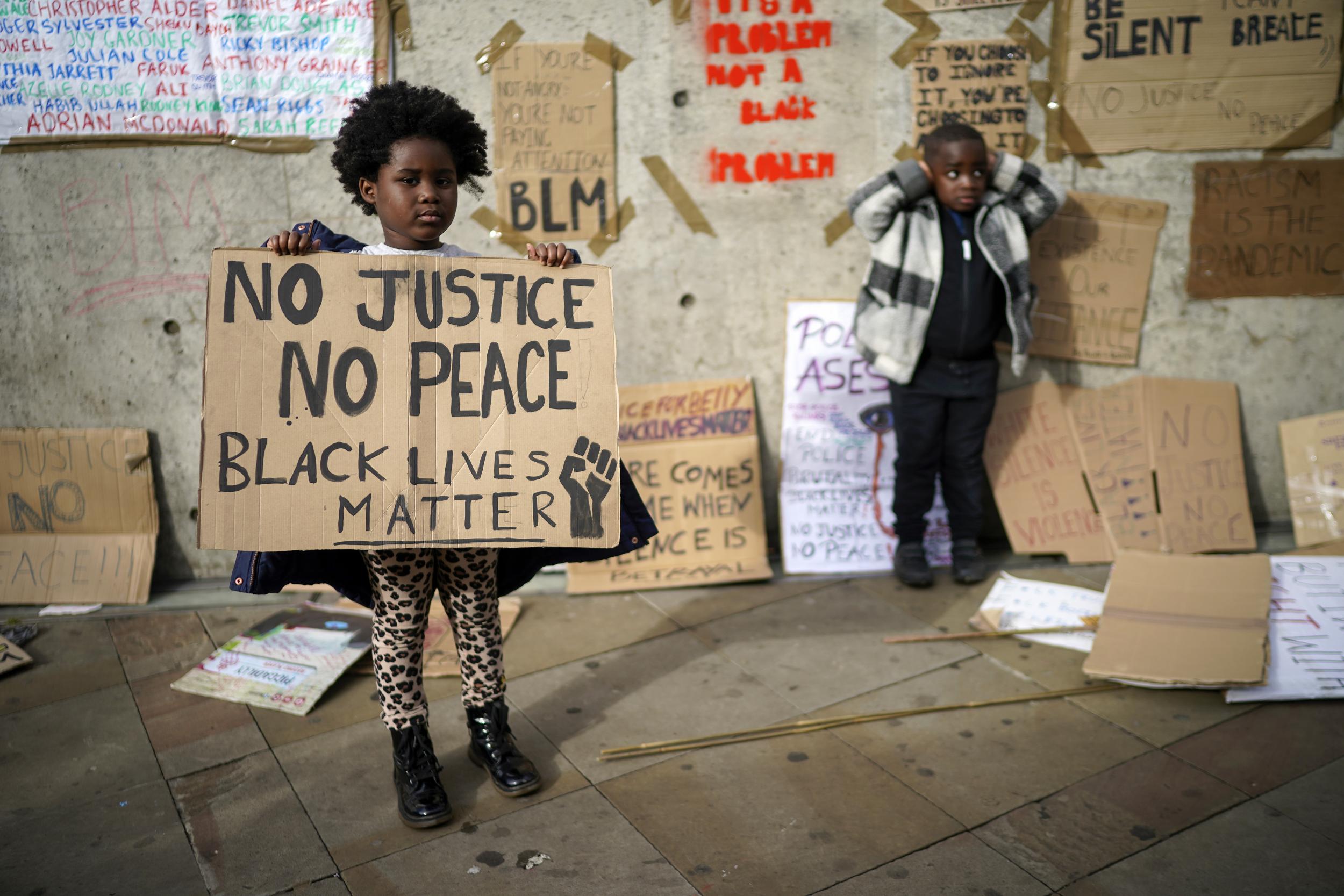
5/50 6 June 2020
Children pose for their family in front of discarded placards fixed on a wall in Piccadilly Gardens after a Black Lives Matter demonstrations in Manchester. The death of an African-American man, George Floyd, while in the custody of Minneapolis police has sparked protests across the United States, as well as demonstrations of solidarity in many countries around the world
Getty
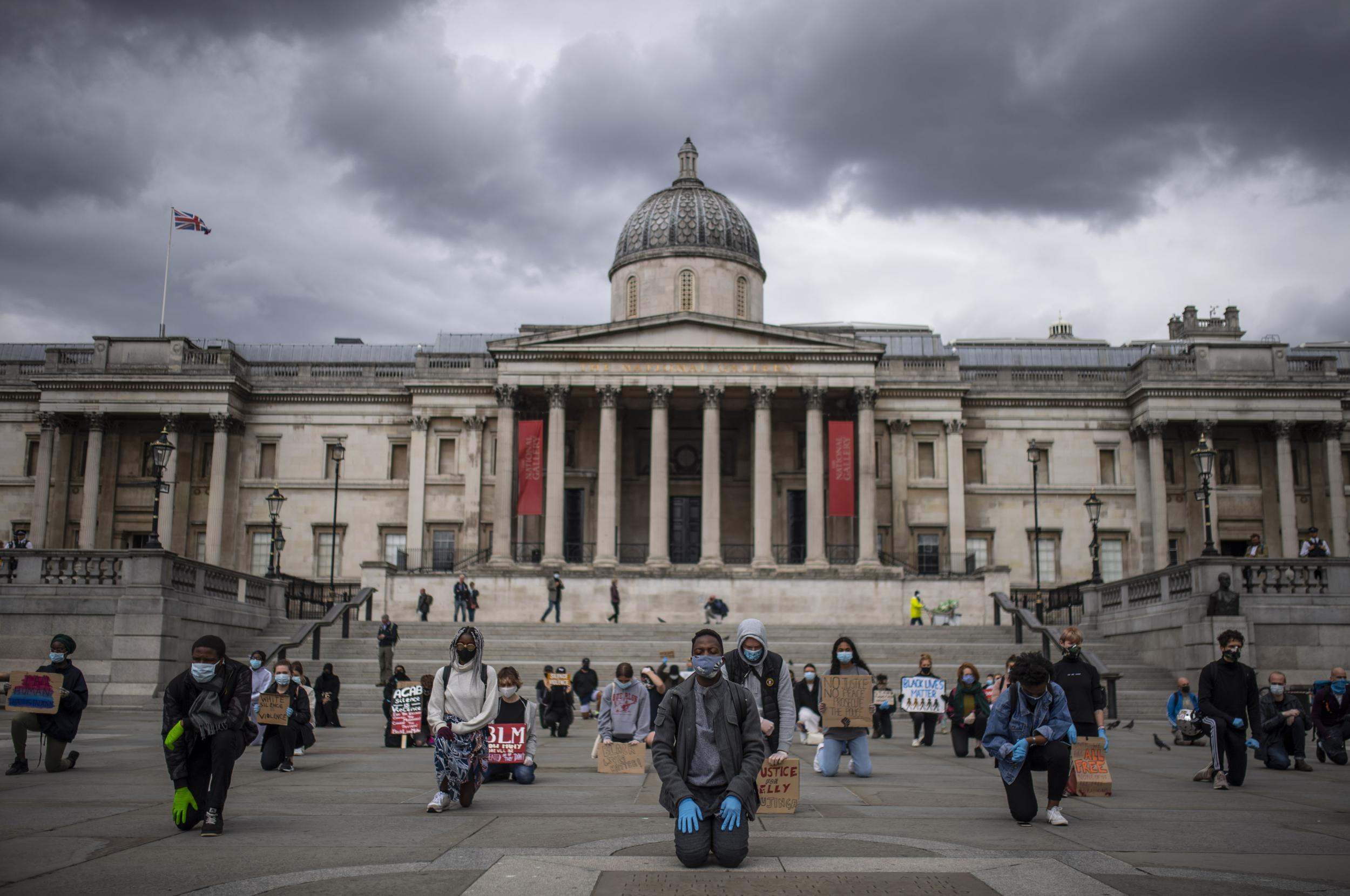
6/50 5 June 2020
Protesters kneel in Trafalgar Square during a Black Lives Matter demonstration in London, England. The death of an African-American man, George Floyd, while in the custody of Minneapolis police has sparked protests across the United States, as well as demonstrations of solidarity in many countries around the world
Getty
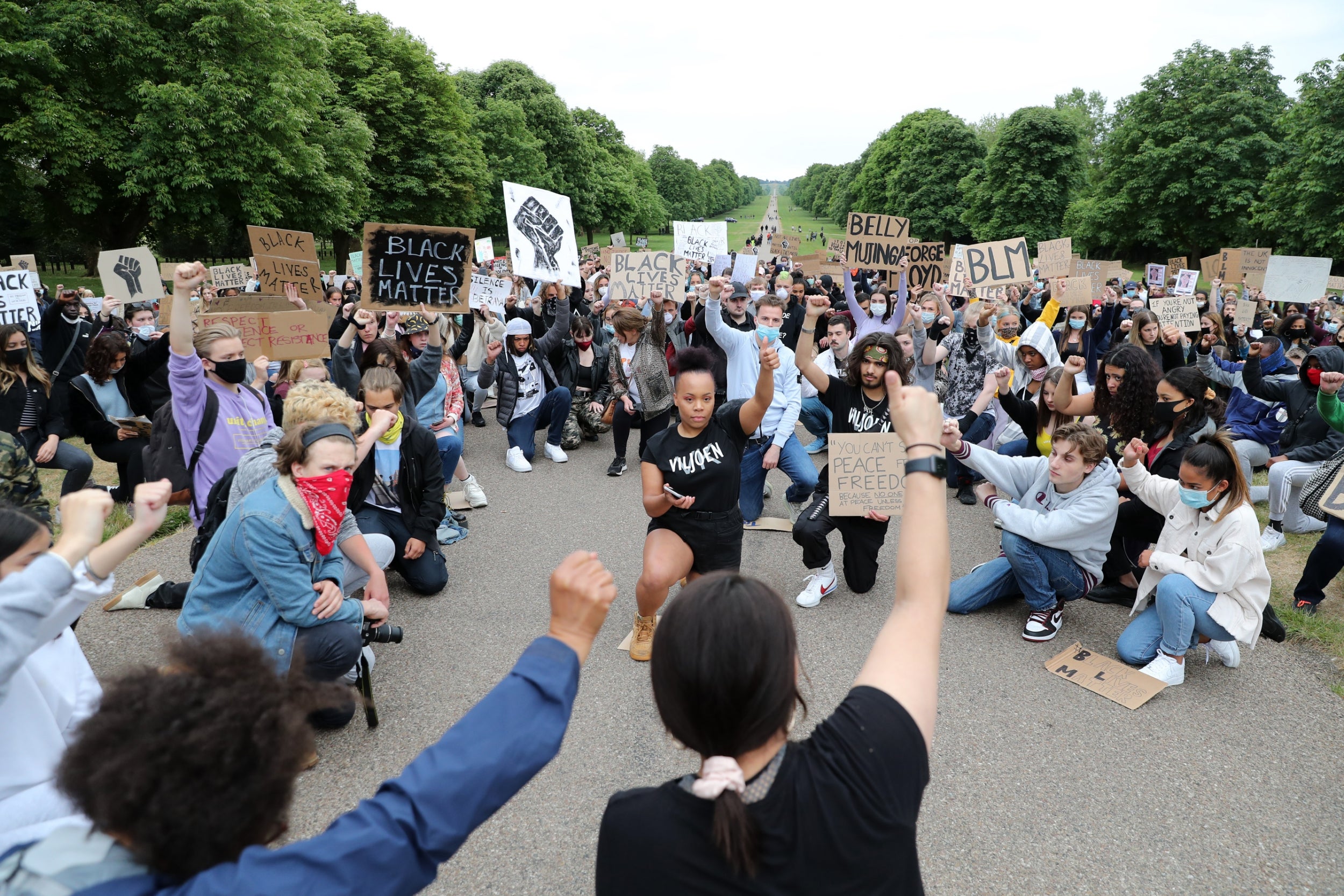
7/50 4 June 2020
Protestors march from Windsor Castle in solidarity with the Black Lives Matter movement
Getty
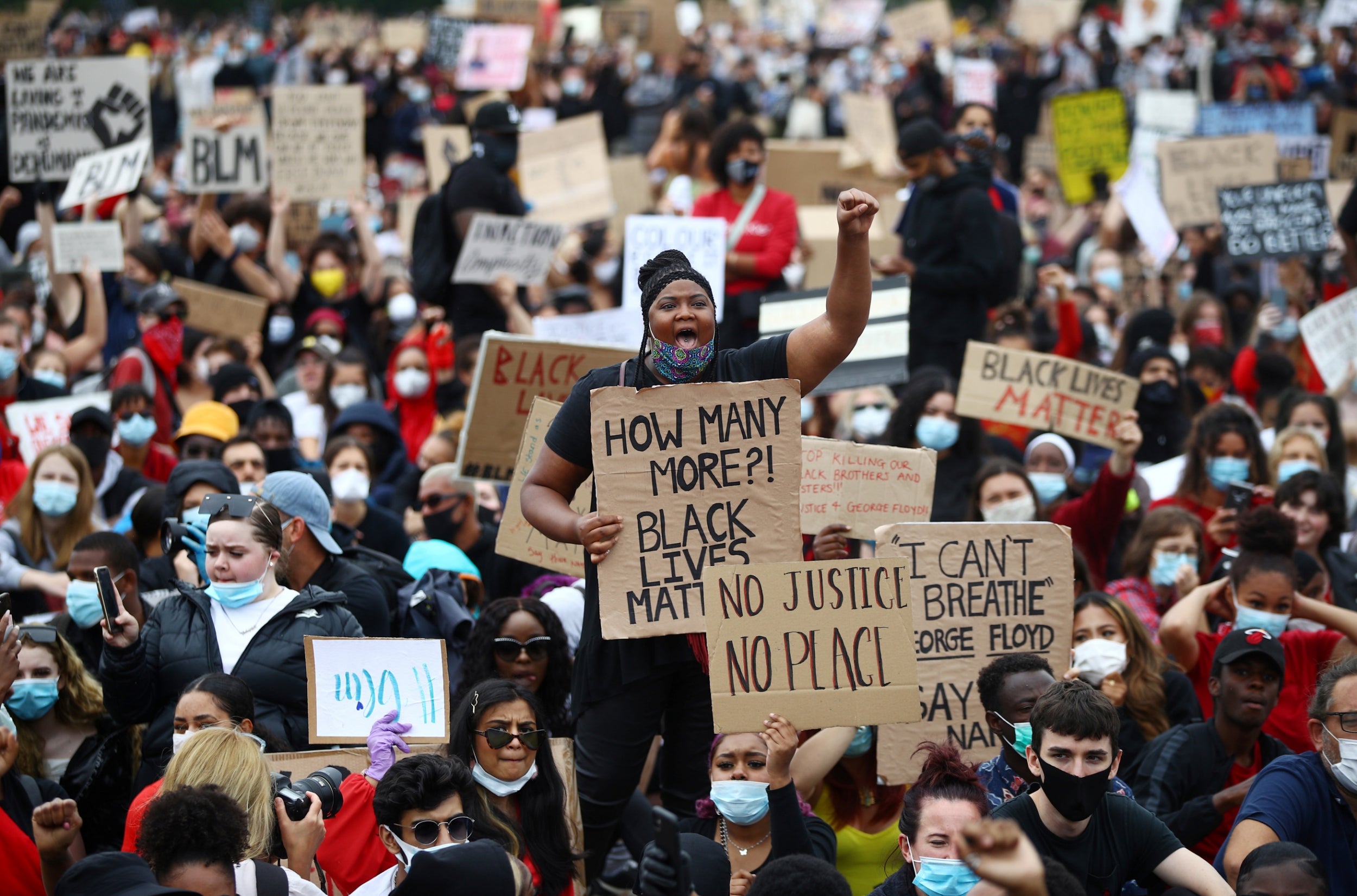
8/50 3 June 2020
People wearing face masks hold banners in Hyde Park during a Black Lives Matter protest following the death of George Floyd who died in police custody in Minneapolis
Reuters
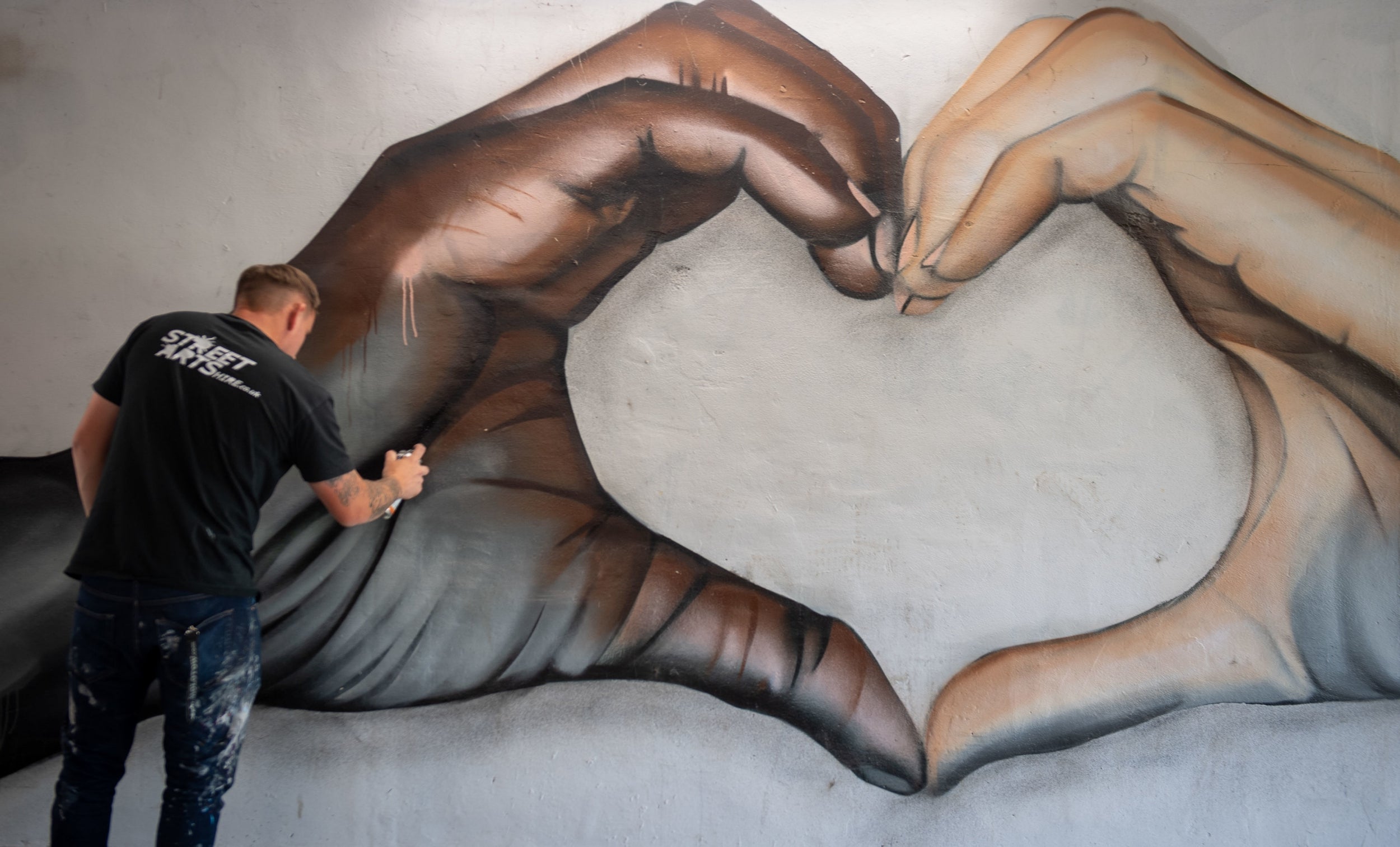
9/50 2 June 2020
Street artist Nath Murdoch touches up his anti-racism mural in Peterborough, Cambridgeshire
PA
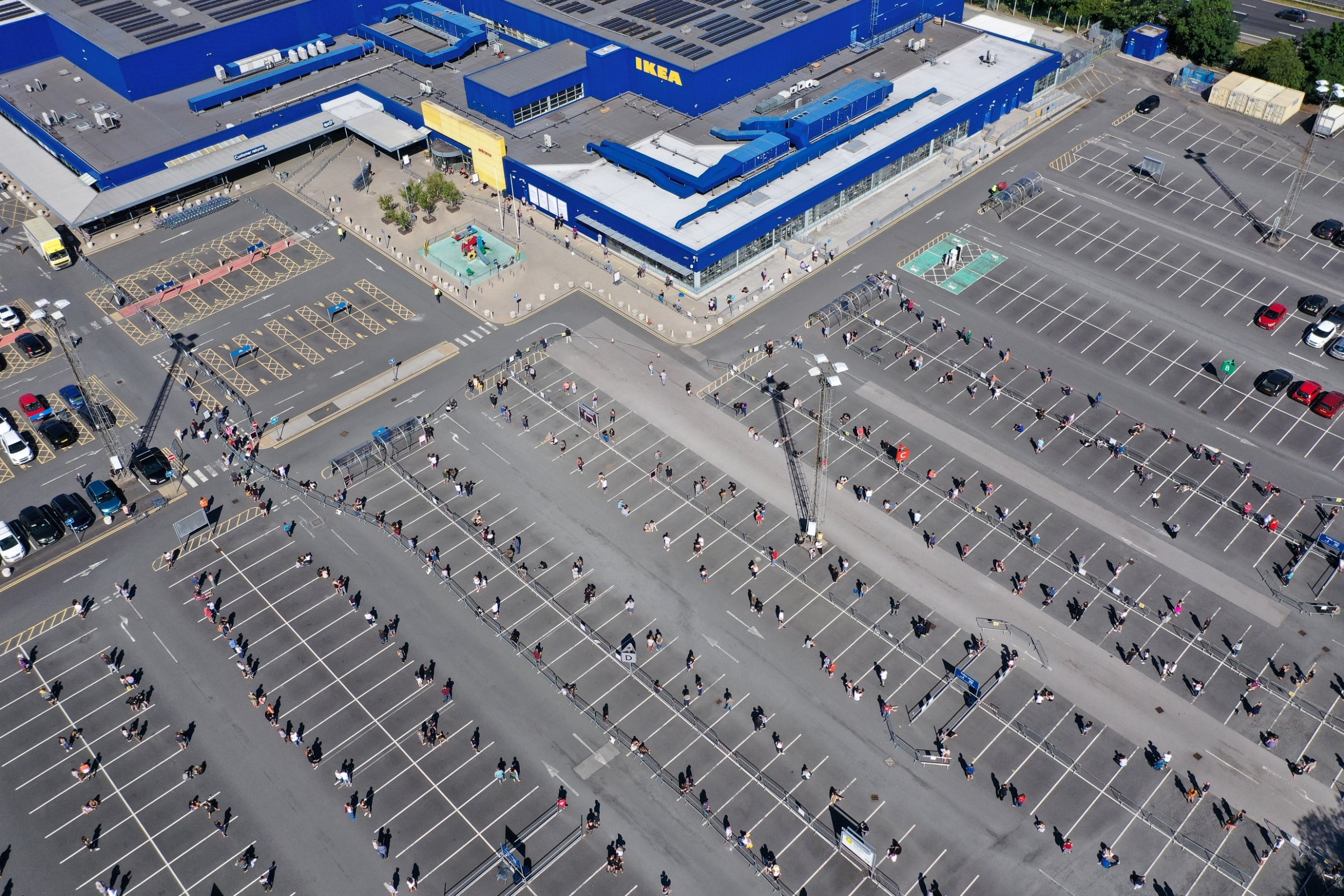
10/50 1 June 2020
Customers socially distance themselves as they queue to enter Ikea in Warrington. The store opening saw large queues of people and traffic on adjacent roads as it reopened after the lockdown. The furniture and housewares chain reopened its stores across England and Northern Ireland subject to several restrictions, keeping its restaurants closed and asking customers to shop alone
Getty
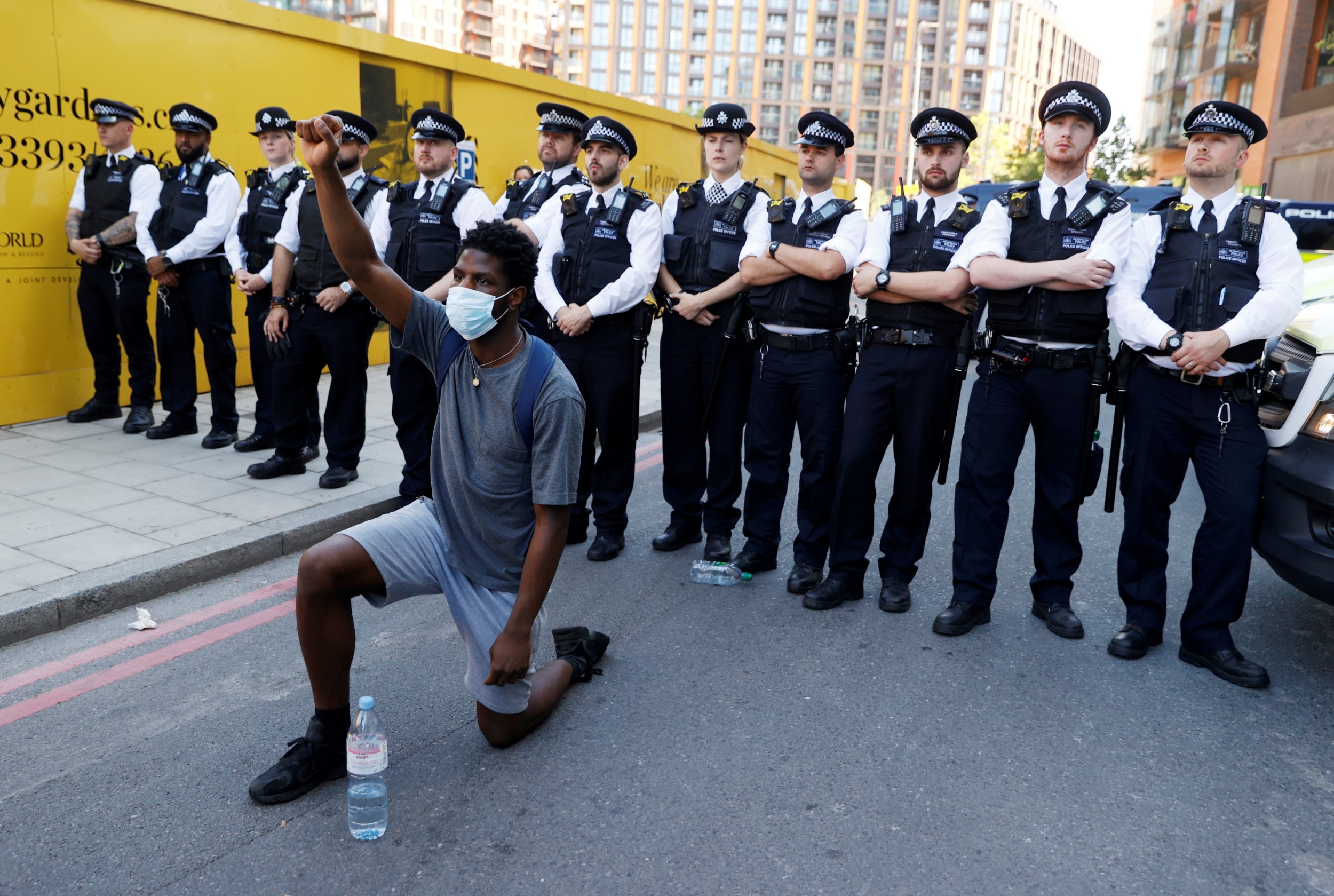
11/50 31 May 2020
A man wearing a protective face mask kneels in front of police officers during a protest against the death in Minneapolis police custody of African-American man George Floyd near the U.S. Embassy, London, Britai
Reuters

12/50 30 May 2020
Visitors at Grassholme Reservoir in Lunedale, Co Durham are able to cross an ancient packhorse bridge as work on the dam wall means water levels have dropped signifcantly to reveal this monument of the pas
UK

13/50 29 May 2020
British Tennis player Maia Lumsden in action at Bridge of Allan Tennis Club. People can meet family and friends outdoors and play sports such as golf and tennis again as the country is moving into phase one of the Scottish Government’s plan for gradually lifting lockdown
PA
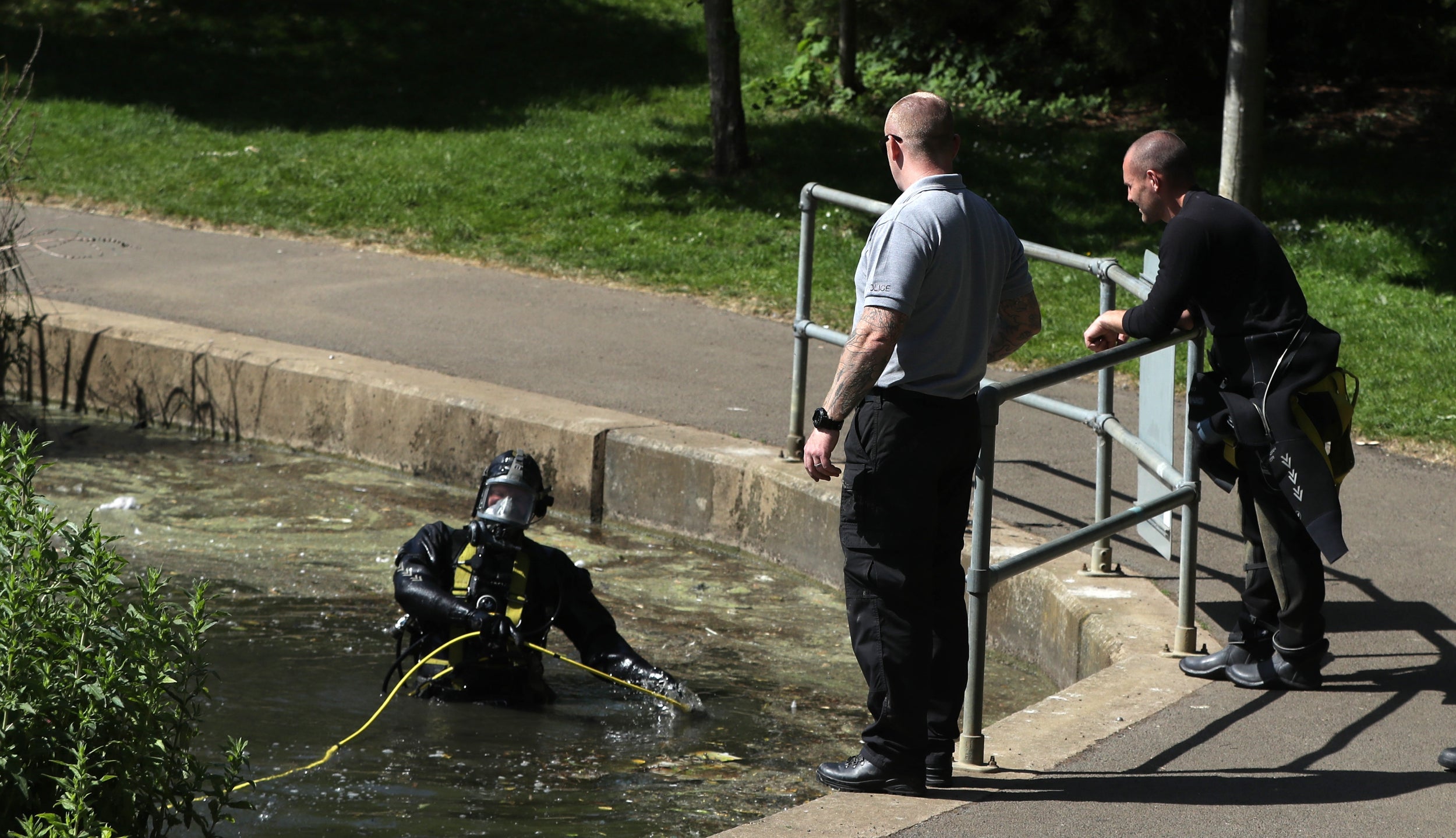
14/50 28 May 2020
A police frogman, searches for a weapon in Abington Lake in in Northampton
Getty
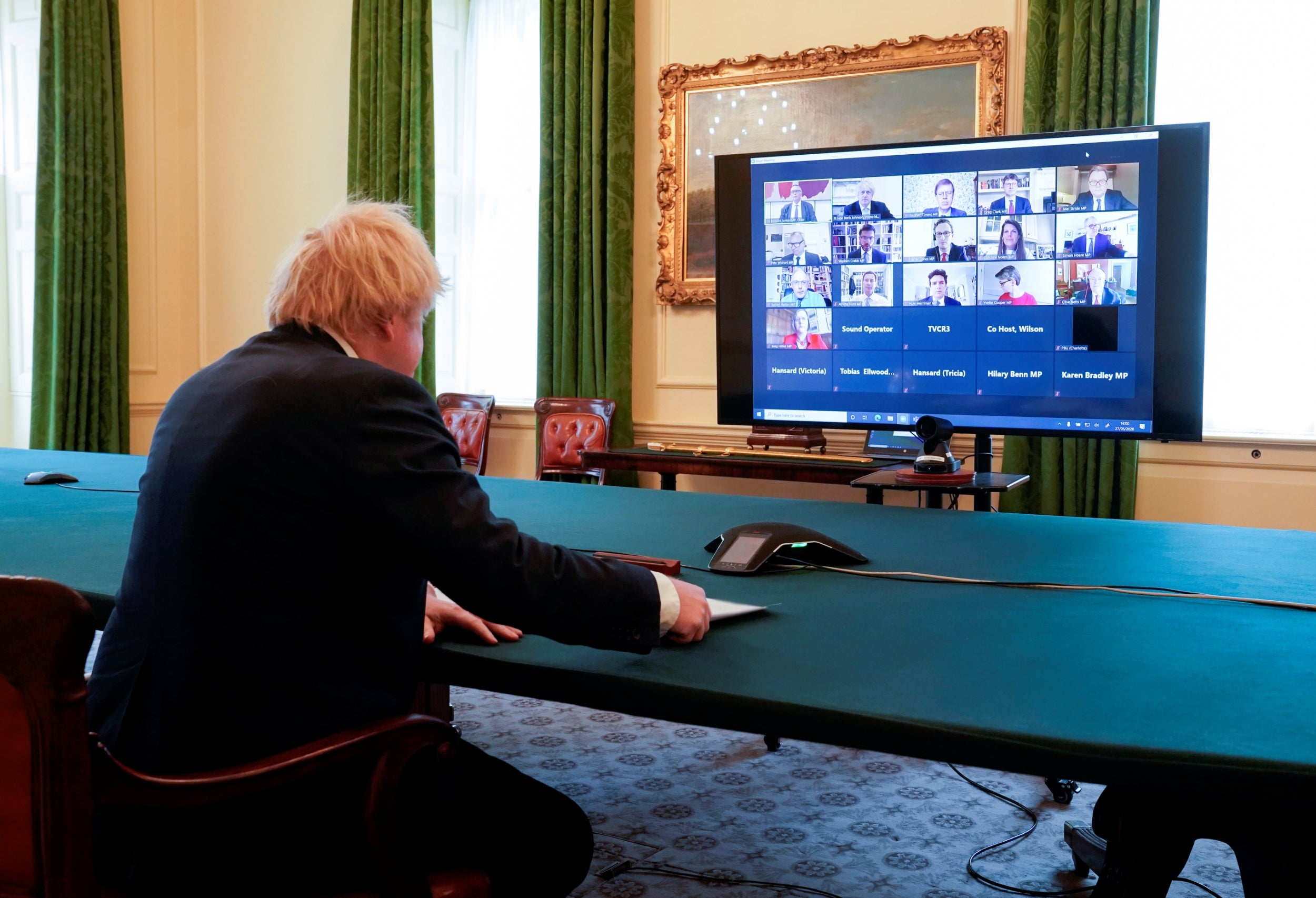
15/50 27 May 2020
Prime Minister Boris Johnson appears before the Liaison Committee via Zoom from the cabinet room at 10 Downing Street, amid the coronavirus
10 Downing Street/Reuters
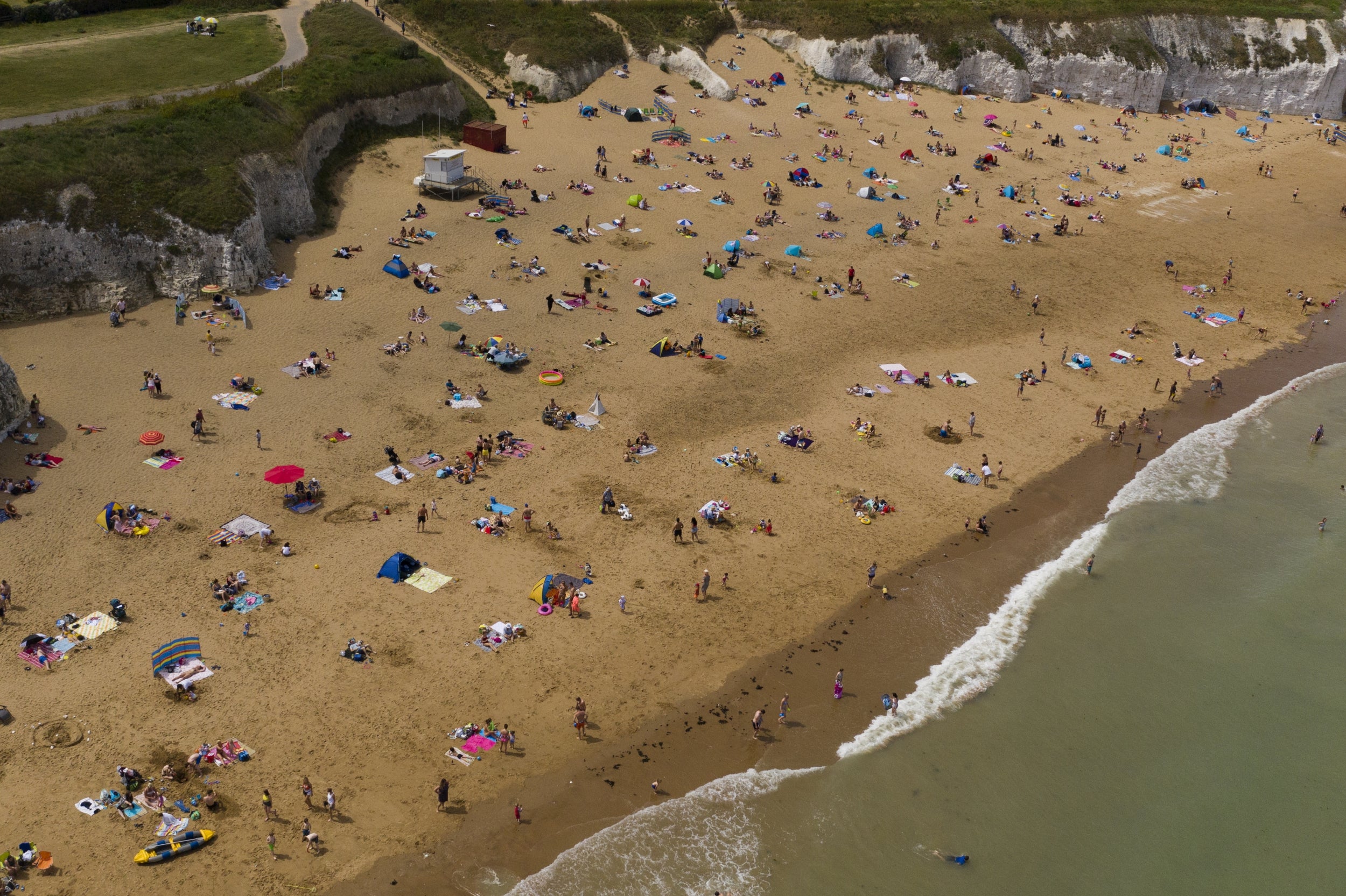
16/50 26 May 2020
Members of the public relax on the beach at Botany Bay in Margate
Getty
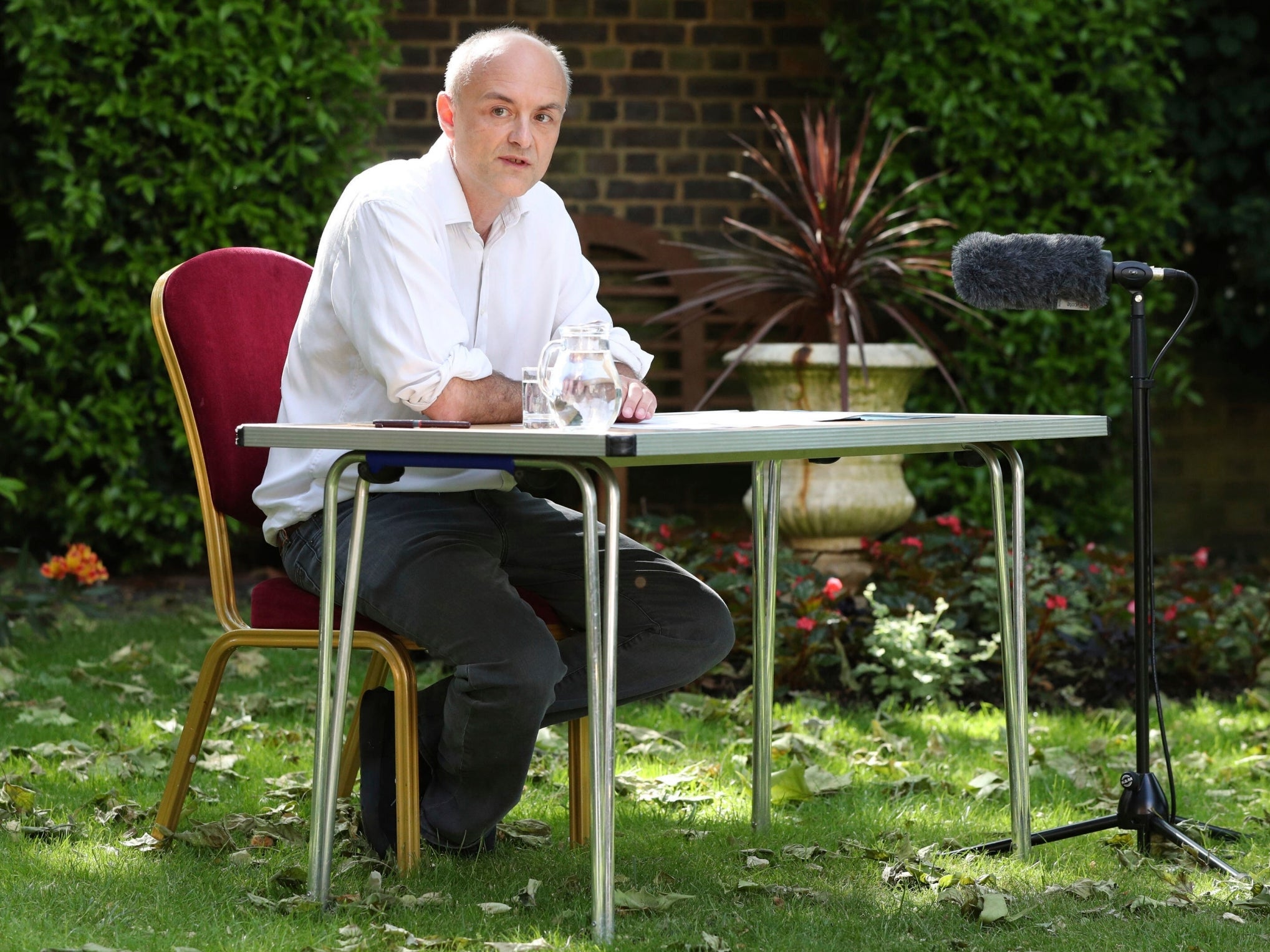
17/50 25 May 2020
Dominic Cummings, senior aide to Prime Minister Boris Johnson, makes a statement inside 10 Downing Street, London, over allegations he breached coronavirus lockdown restrictions
AP
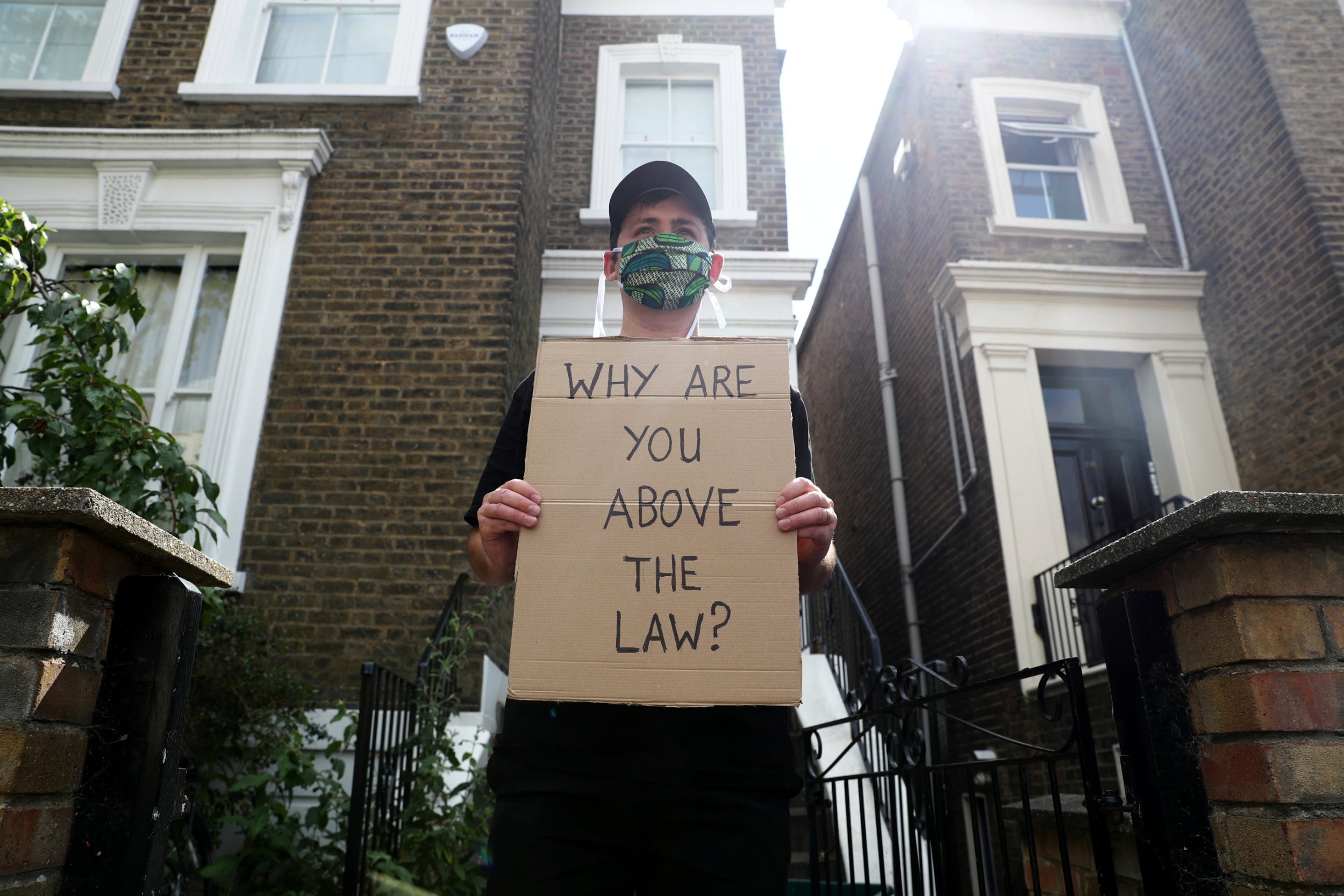
18/50 24 May 2020
A demonstrator holds a sign reading ‘Why are you above the law?’ outside the house of Dominic Cummings in London, following allegations Cummings broke coronavirus lockdown rules by travelling across the country
Reuters
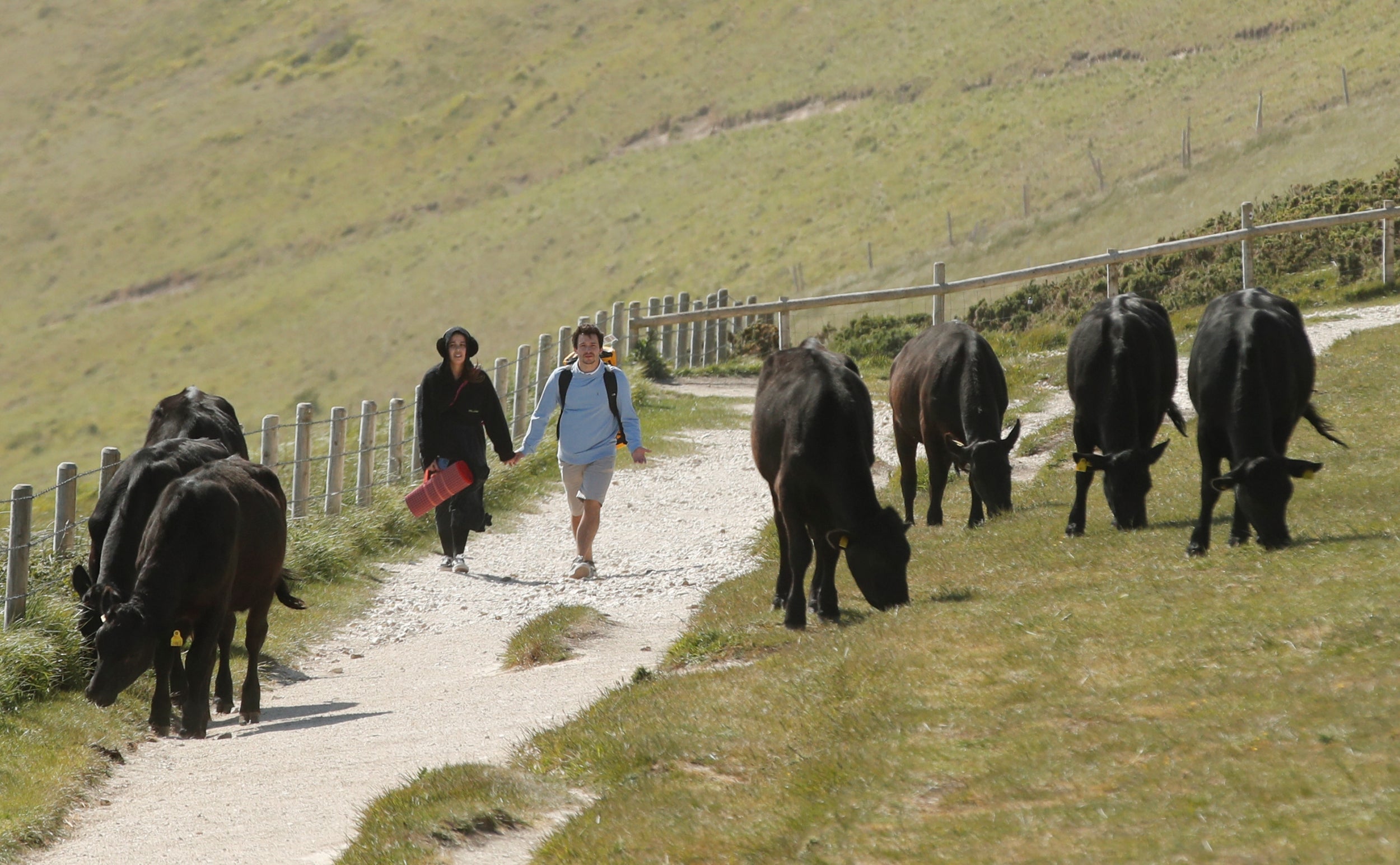
19/50 23 May 2020
People take a walk near Durdle Door as cows graze in Lulworth
Reuters
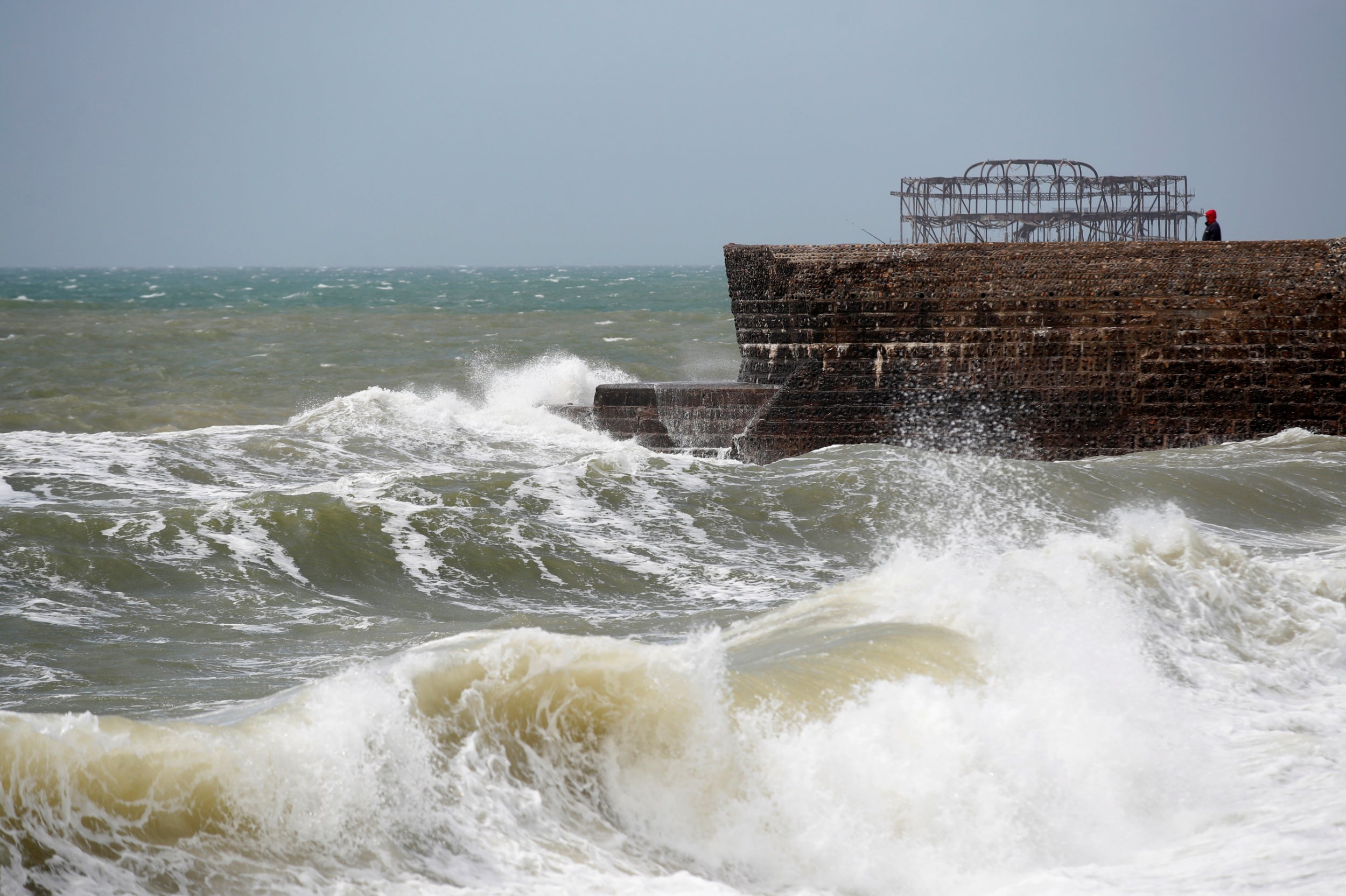
20/50 22 May 2020
Waves break onto a wall at Brighton beach
Reuters
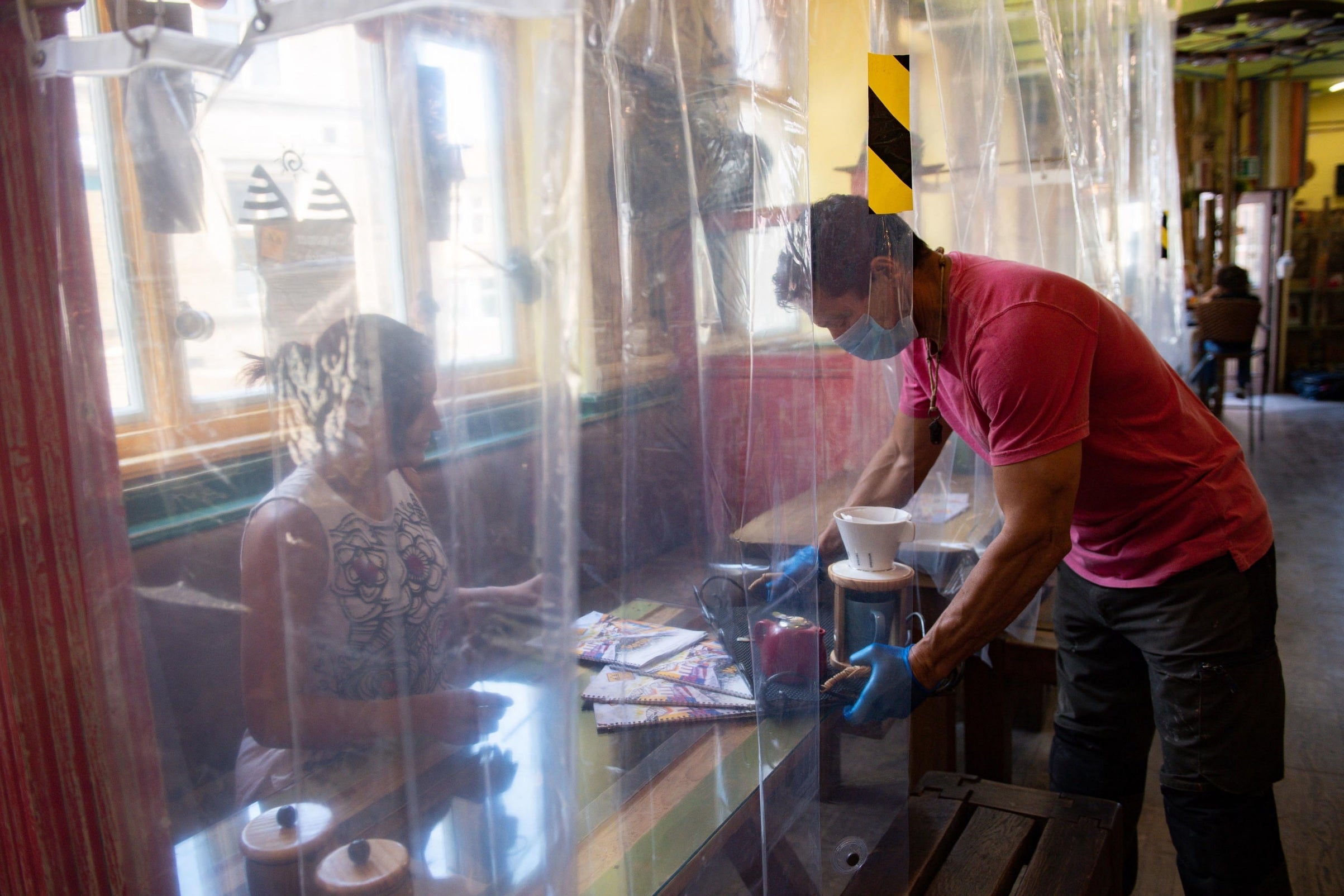
21/50 21 May 2020
Cafe owner Francini Osorio serves customers in a trial phase during the coronavirus lockdown. Osorio has installed an air purifier and 35 clear shower curtains, which will divide customers and tables, in the Francini Cafe De Colombia, Worcester, ready for the re-opening of his business as lockdown restrictions are eased
PA
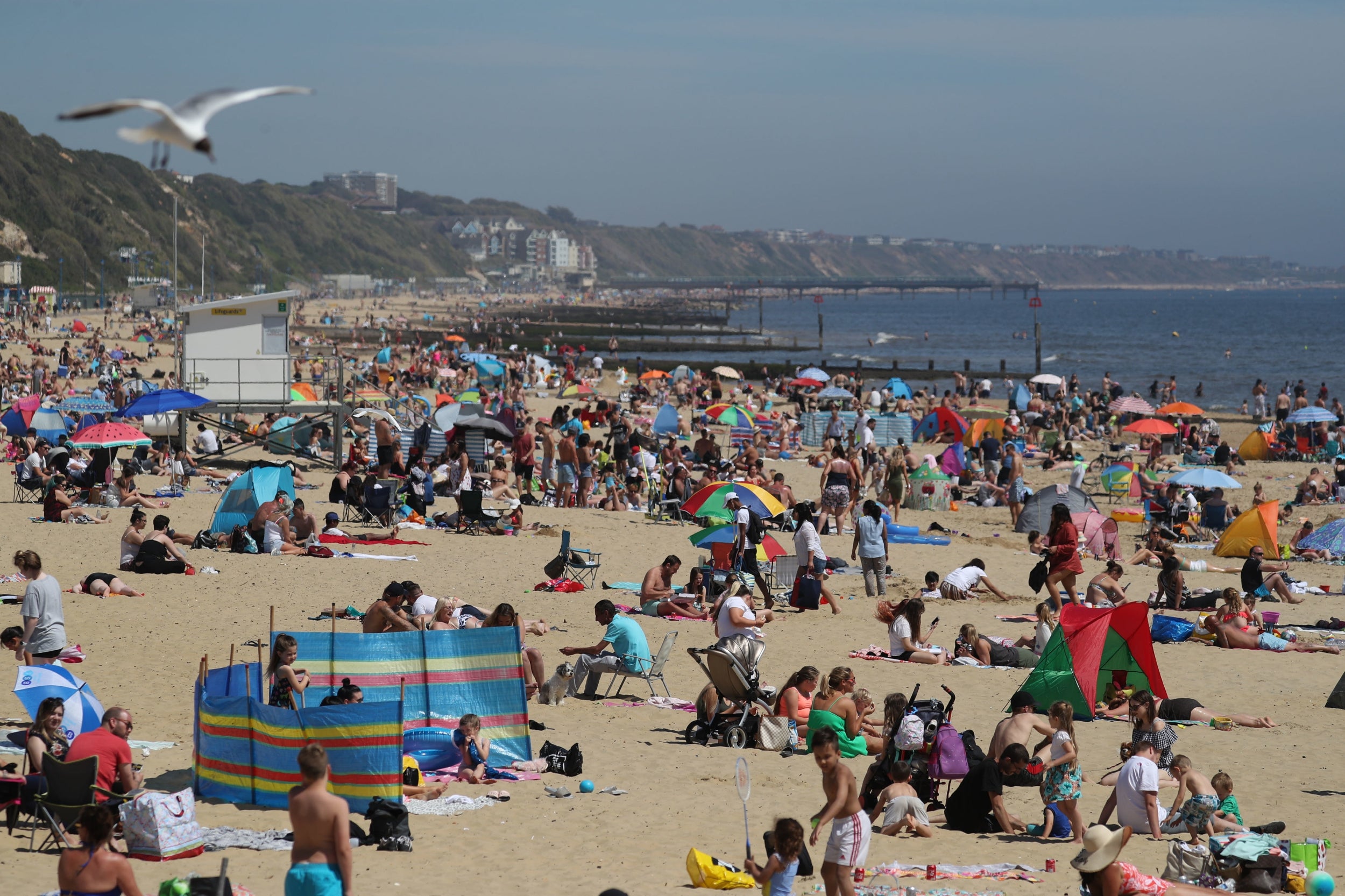
22/50 20 May 2020
People at Bournemouth beach in Dorset, as people flock to parks and beaches with lockdown measures eased. The Met Office has predicted the hottest day of the year
PA

23/50 19 May 2020
A dog jumps into the water as families relax at a Lido in London
AP

24/50 18 May 2020
A fan celebrates outside Celtic Park after Celtic were crowned champions of the Scottish Premiership. Hearts were also relegated after a decision was made to conclude the season with immediate effect
PA
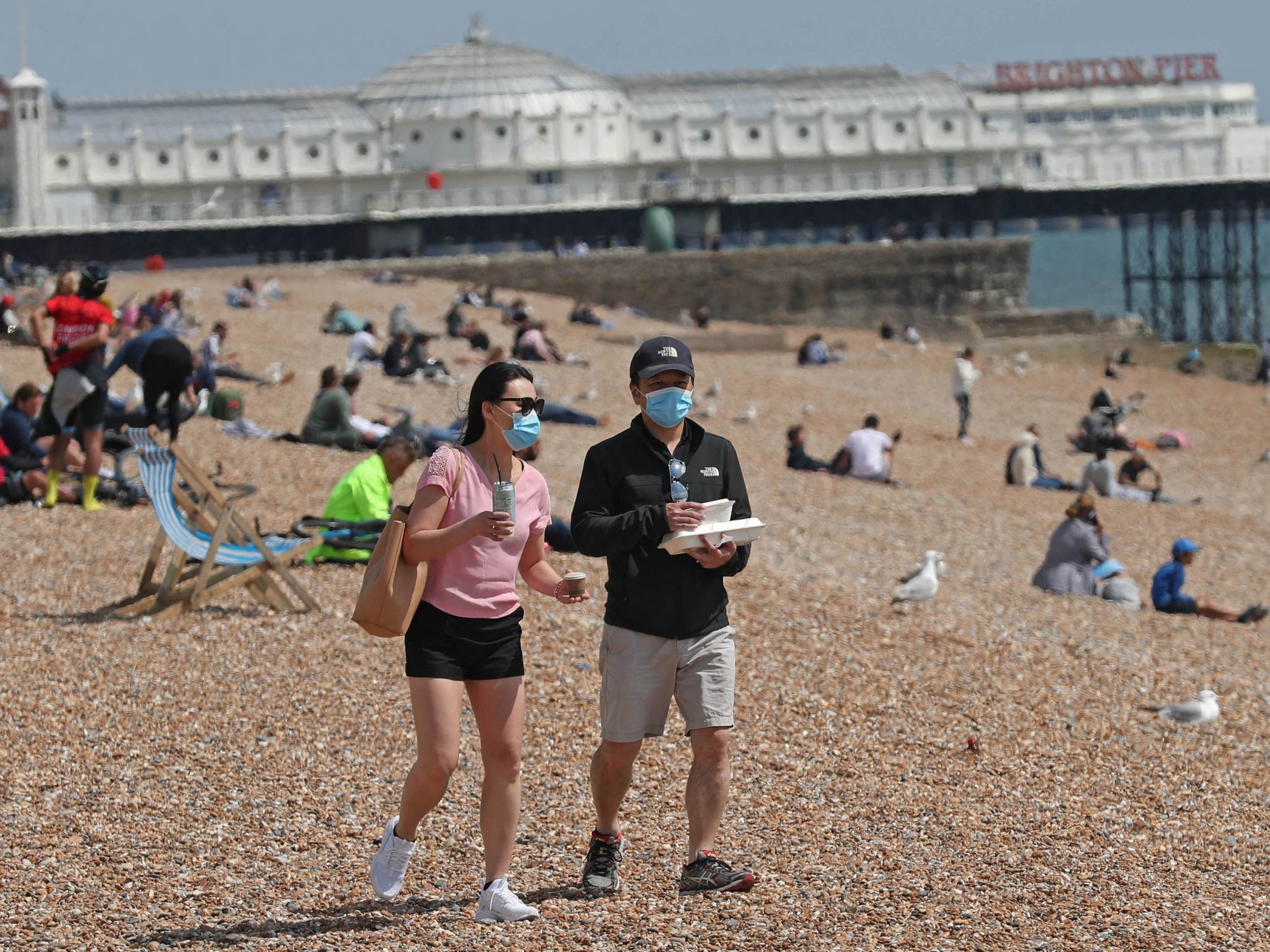
25/50 17 May 2020
People on Brighton beach after the introduction of measures to bring the country out of lockdown
PA
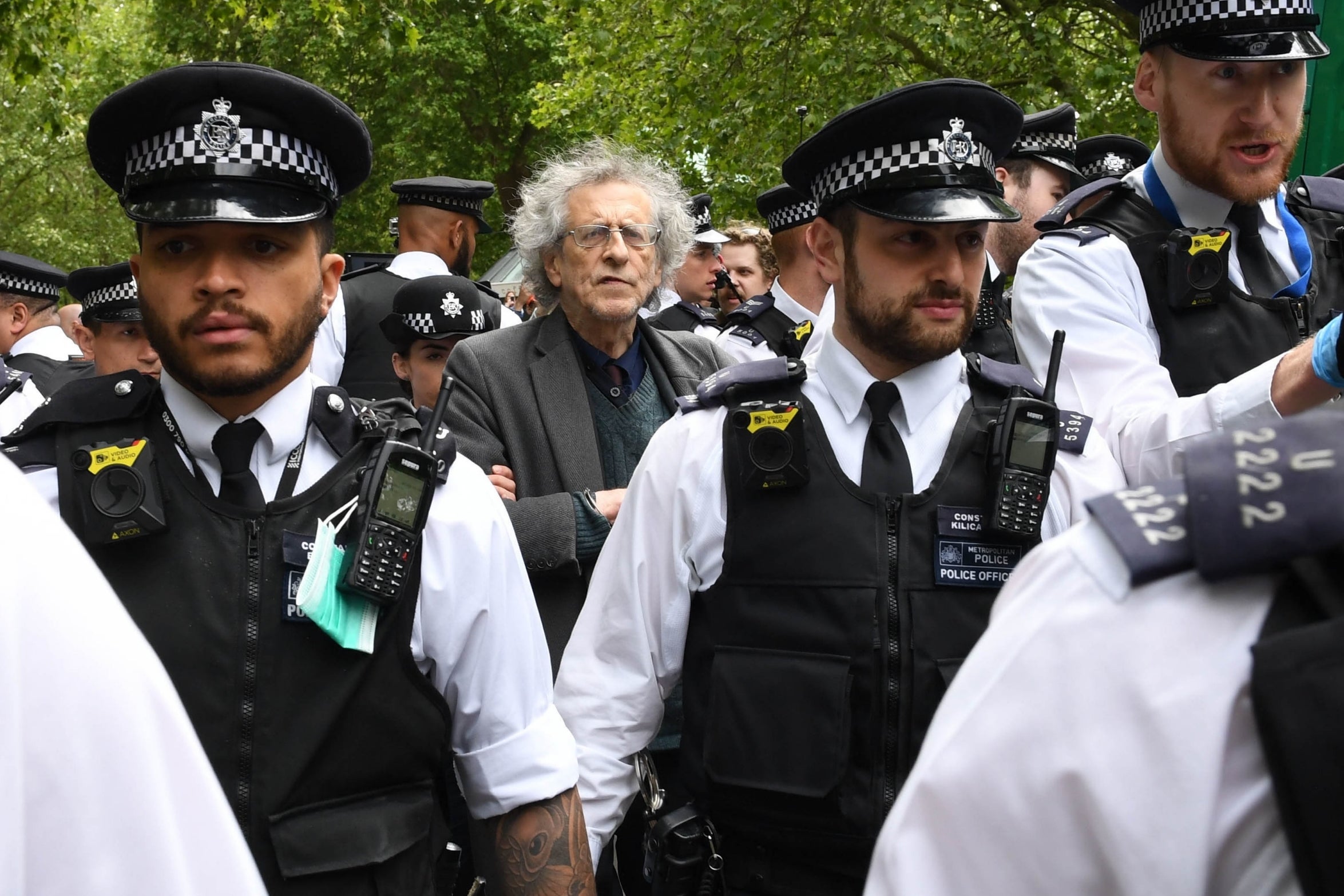
26/50 16 May 2020
Police lead away Piers Corbyn, brother of former Labour leader Jeremy Corbyn, as protesters gather in breach of lockdown rules in Hyde Park in London after the introduction of measures to bring the country out of lockdown.
PA

27/50 15 May 2020
Estonian freelance ballet dancer and choreographer, Eve Mutso performs her daily fitness routine near her home in Glasgow, Scotland
Getty

28/50 14 May 2020
Senior charge nurse Jan Ferguson views artwork “Theatre of Dott’s” by Kate Ive, inspired by Professor Norman Dott and his neurosurgery theatres at the Western General from 1960-2019. It is one of a number of artworks which sit on the walls of NHS Lothians’ Department of Clinical Neurosciences (DCN) which has been transferred into a purpose-built new home on the Little France campus in Edinburgh
PA
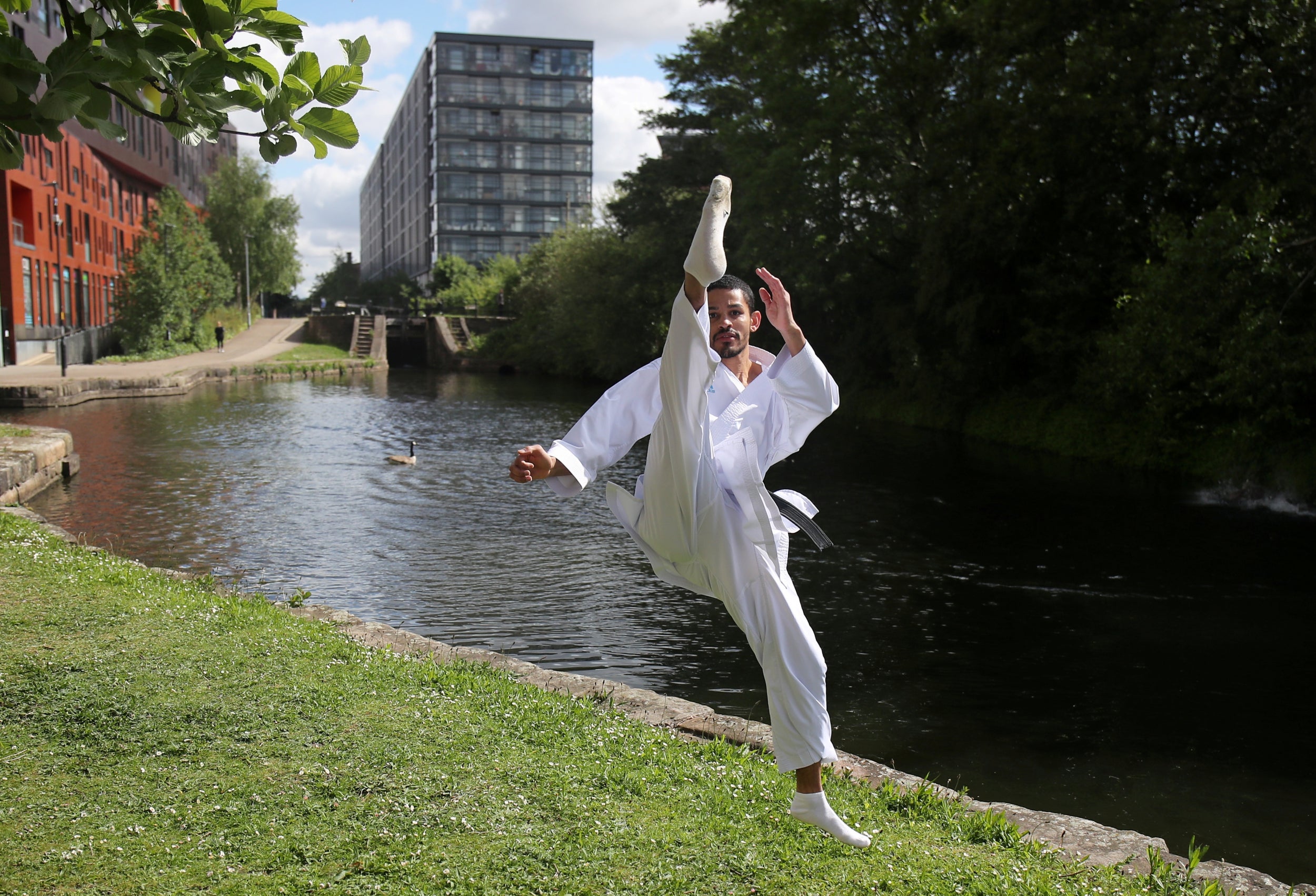
29/50 13 May 2020
Team GB’s karate athlete Jordan Thomas trains outside his apartment in Manchester
Reuters

30/50 12 May 2020
Nurses from central London hospitals protest on international nurses day about the chronic underfunding of the NHS and other issues surrounding the health service outside the gates of Downing Street, London
PA

31/50 11 May 2020
Waves crash at Tynemouth pier on the North East coast
PA
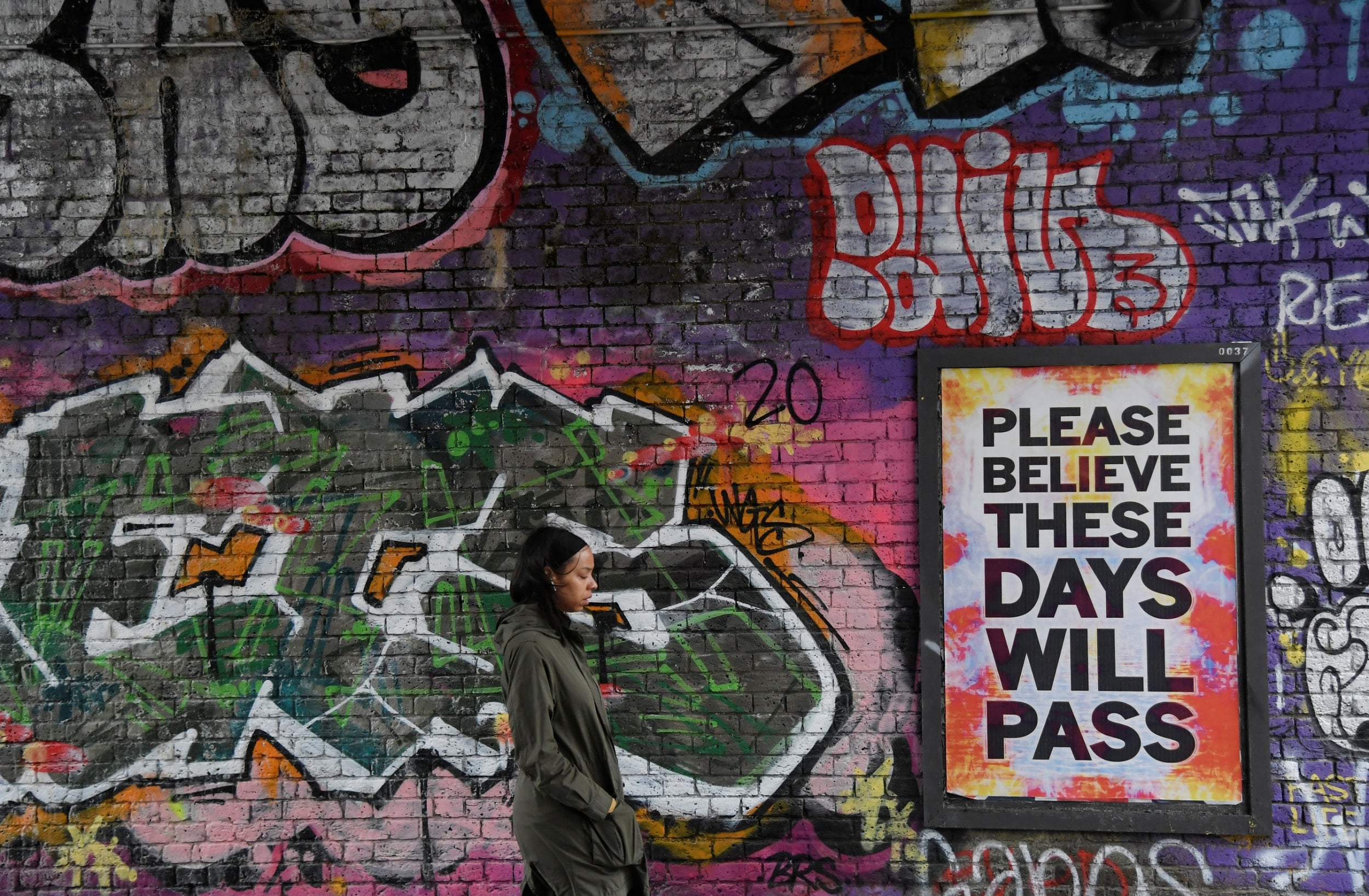
32/50 10 May 2020
A woman passes street art and a poster in East London
Reuters
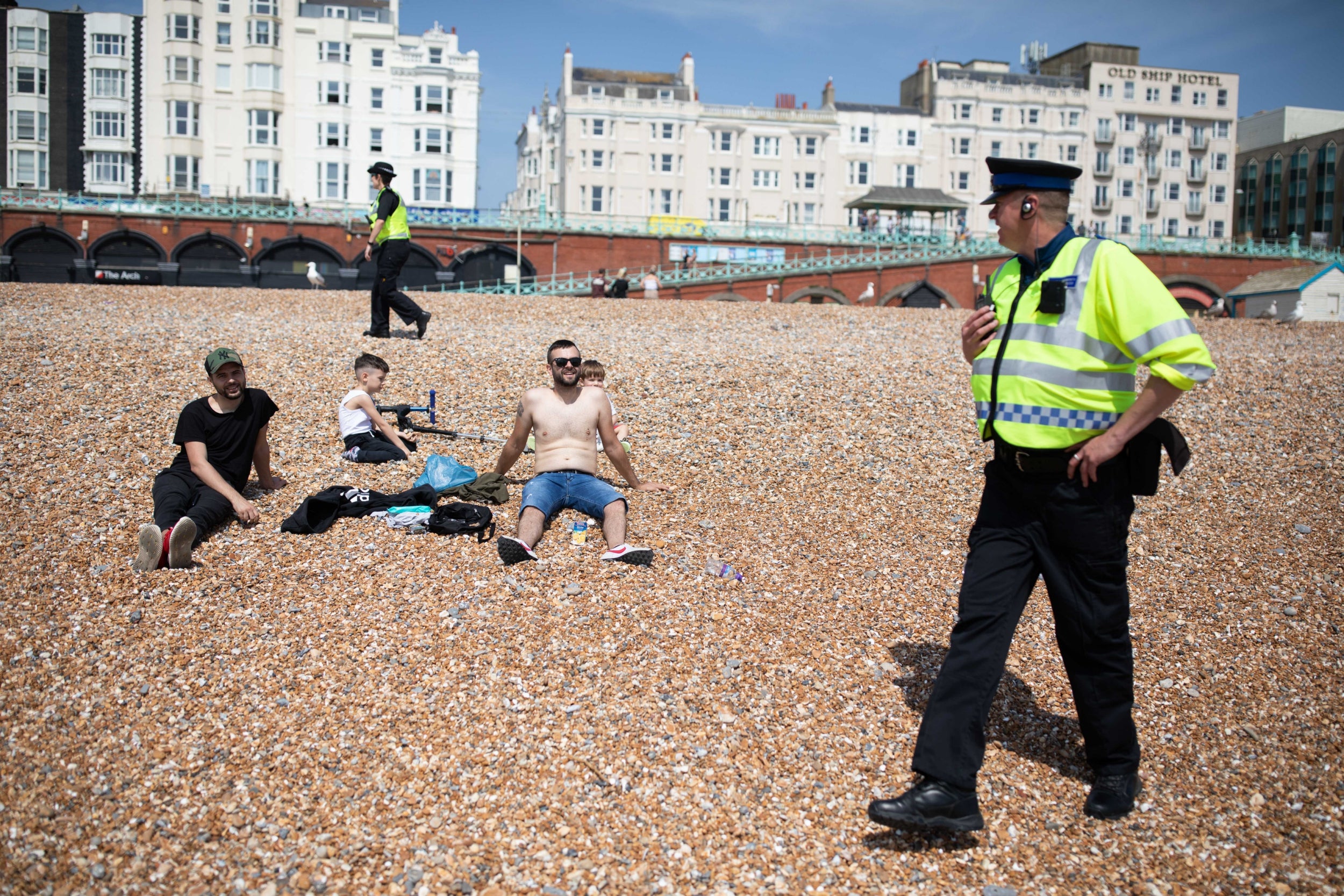
33/50 9 May 2020
Police patrol the beach in Brighton
Getty

34/50 8 May 2020
The British Royal Air Force Red Arrows conduct a fly past over the statue of former British Prime Minister Winston Churchill in London to commemorate the 75th Anniversary of Victory in Europe (VE Day) in Britain
MOD/Reuters
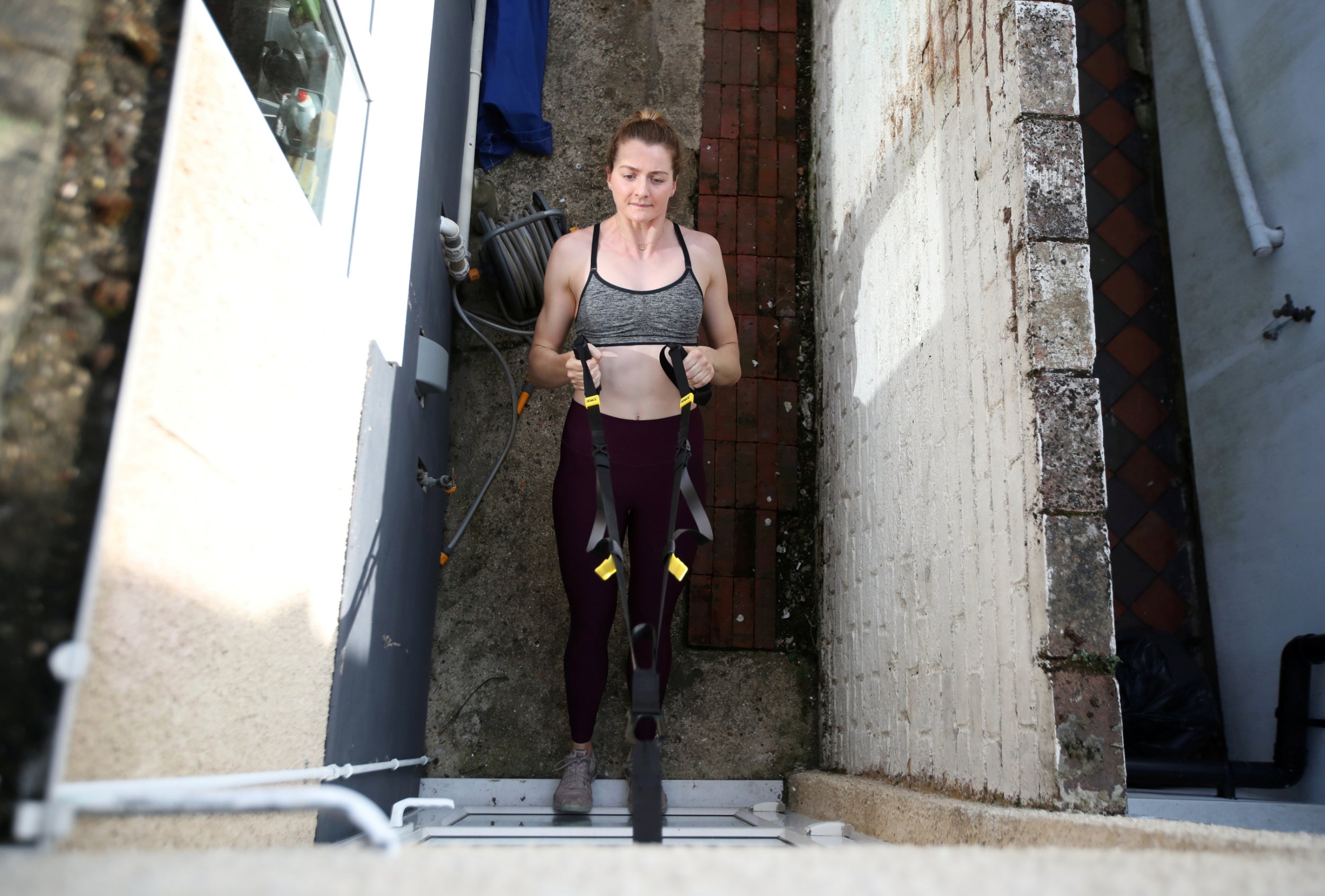
35/50 7 May 2020
Team GB sailor Eilidh McIntyre during a training session at her home in Portsmouth
Reuters
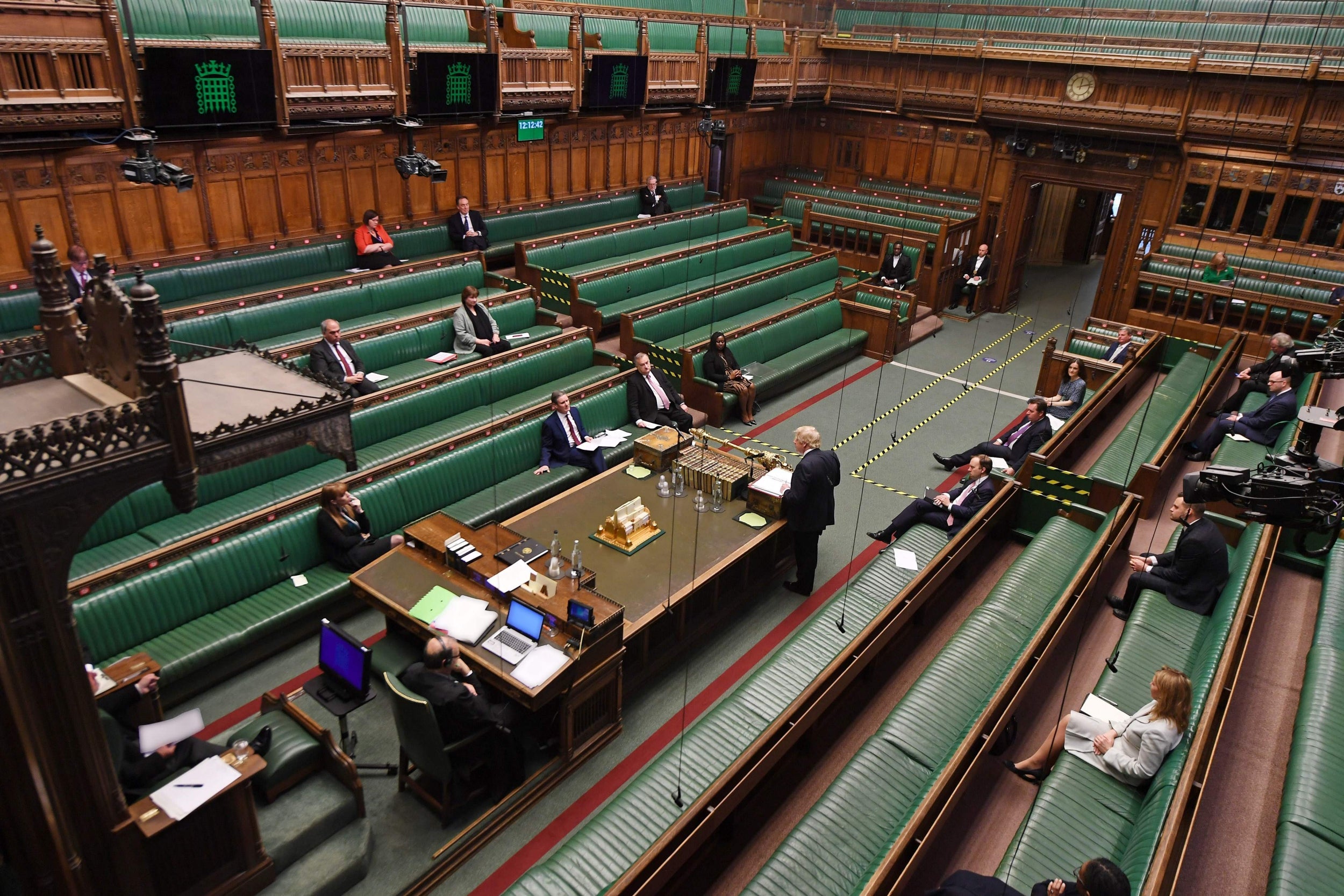
36/50 6 May 2020
Labour Party leader Keir Starmer listens to Prime Minister Boris Johnson speaking during PMQs
UK Parliament/AFP/Getty

37/50 5 May 2020
The sun appears to explode over the horizon in this montage of images captured by photographer Nick Lucas near his home in Ringwood, Hampshire. Nick took a number of pictures just a few seconds apart on a tripod mounted camera which were then combined to give the eye catching dawn image
Nick Lucas/SWNS
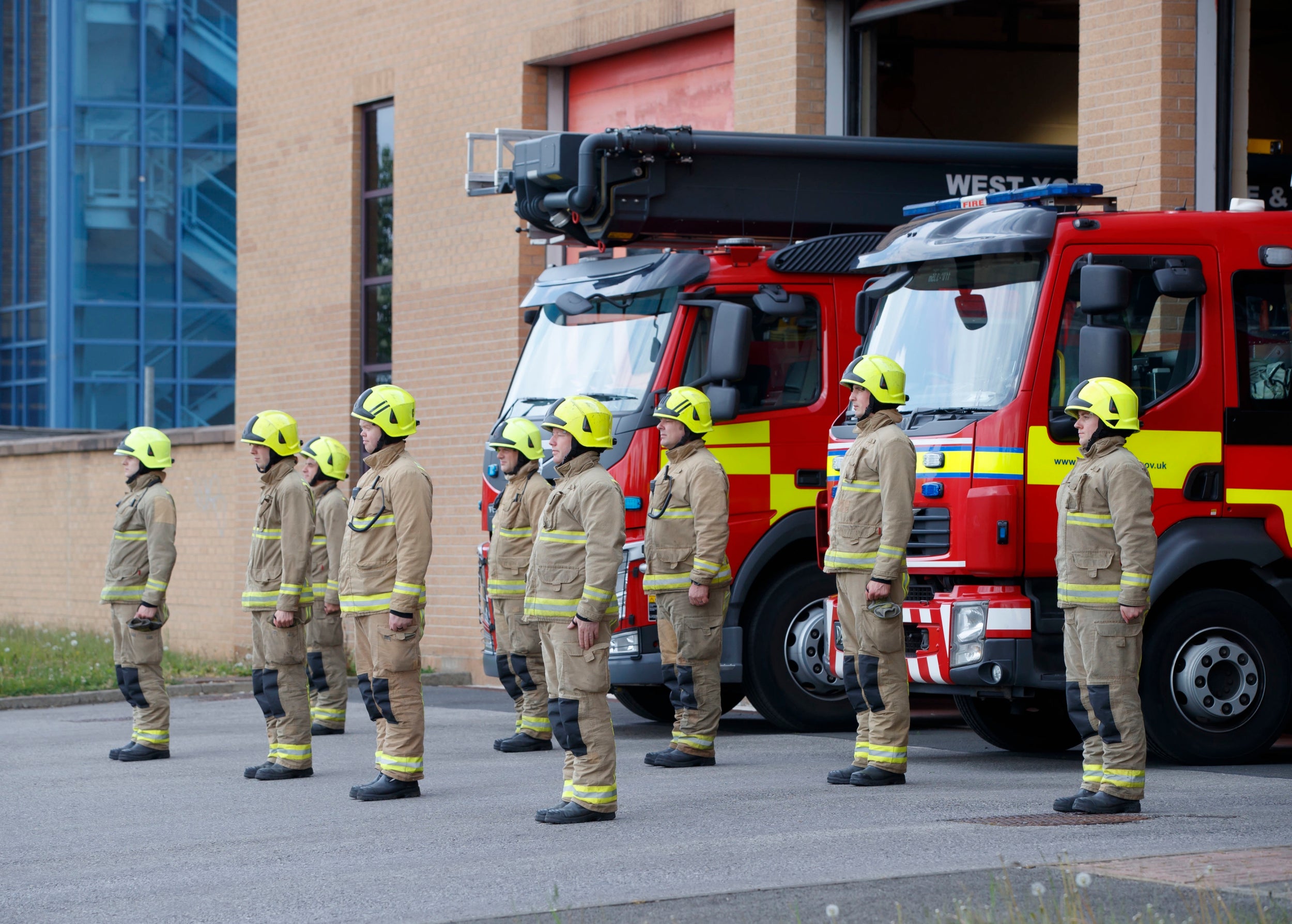
38/50 4 May 2020
Leeds Green Watch firefighters observe a minute’s silence outside the fire station in Kirkstall Rd, in memory their colleagues that lost their lives in the line of duty
PA
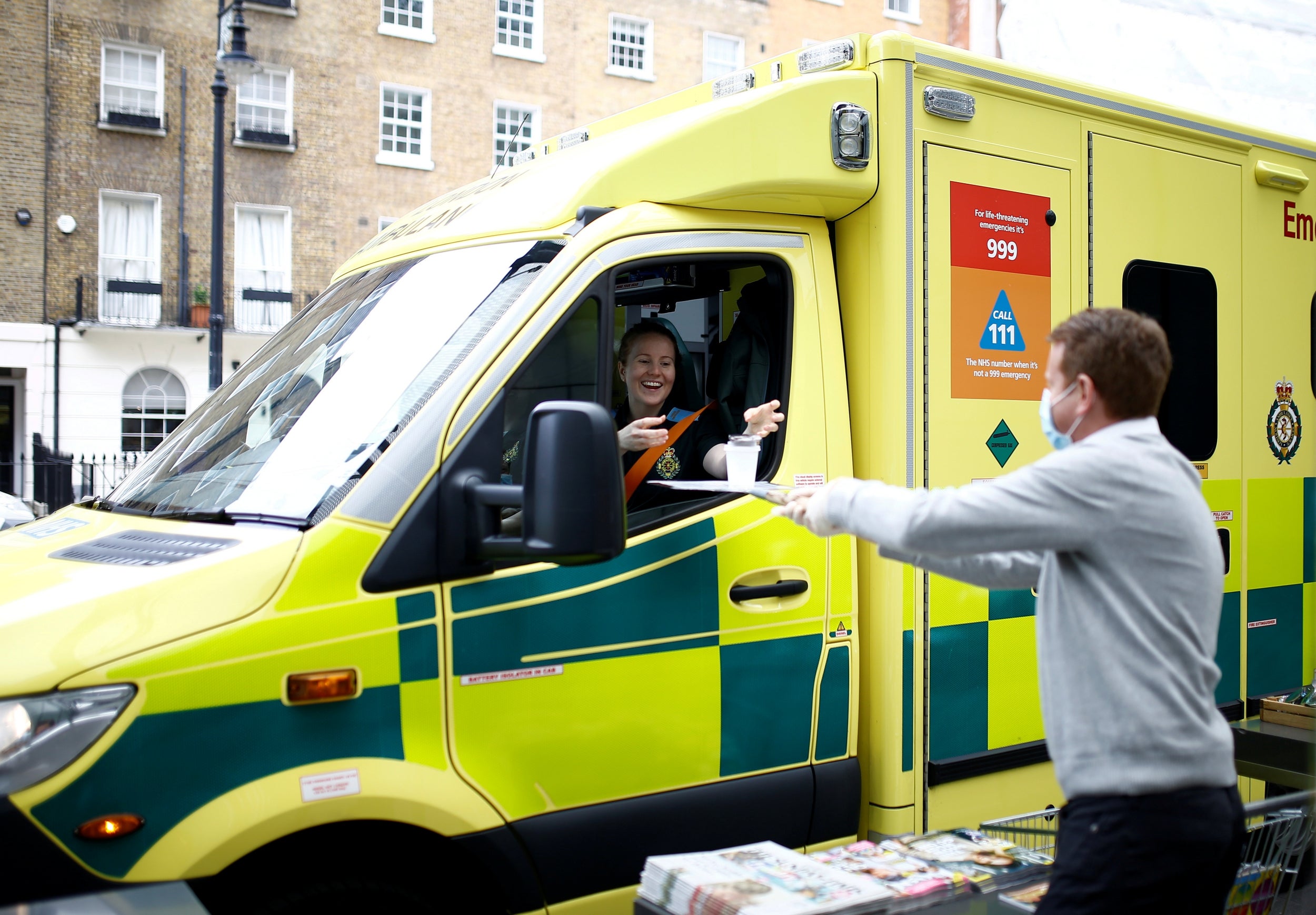
39/50 3 May 2020
Staff at The Berkeley hotel give food to ambulance workers
Reuters
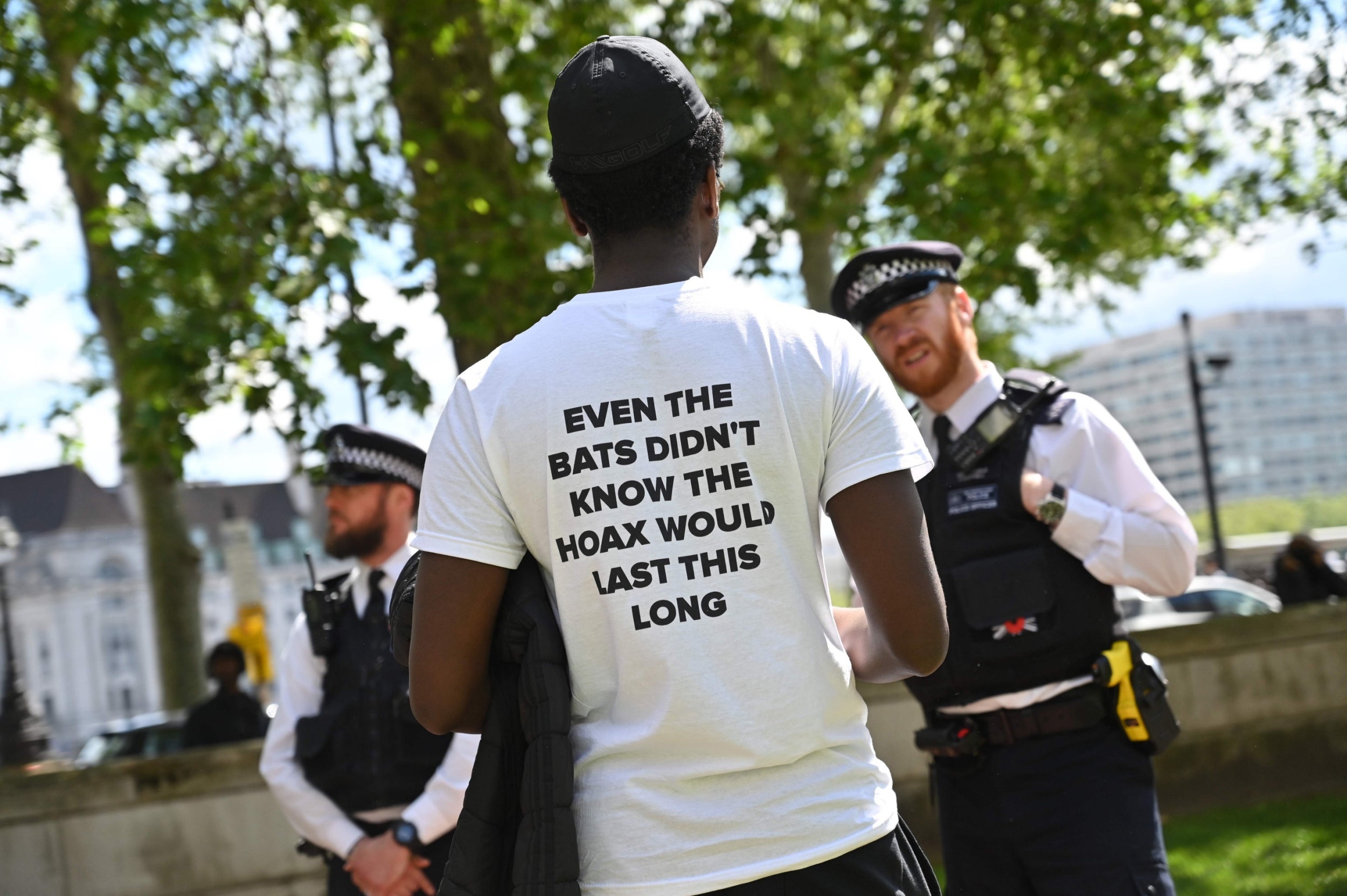
40/50 2 May 2020
One of a small group of anti-lockdown protesters speaks to a police officer as they gather outside New Scotland Yard in Victoria, London
AFP via Getty
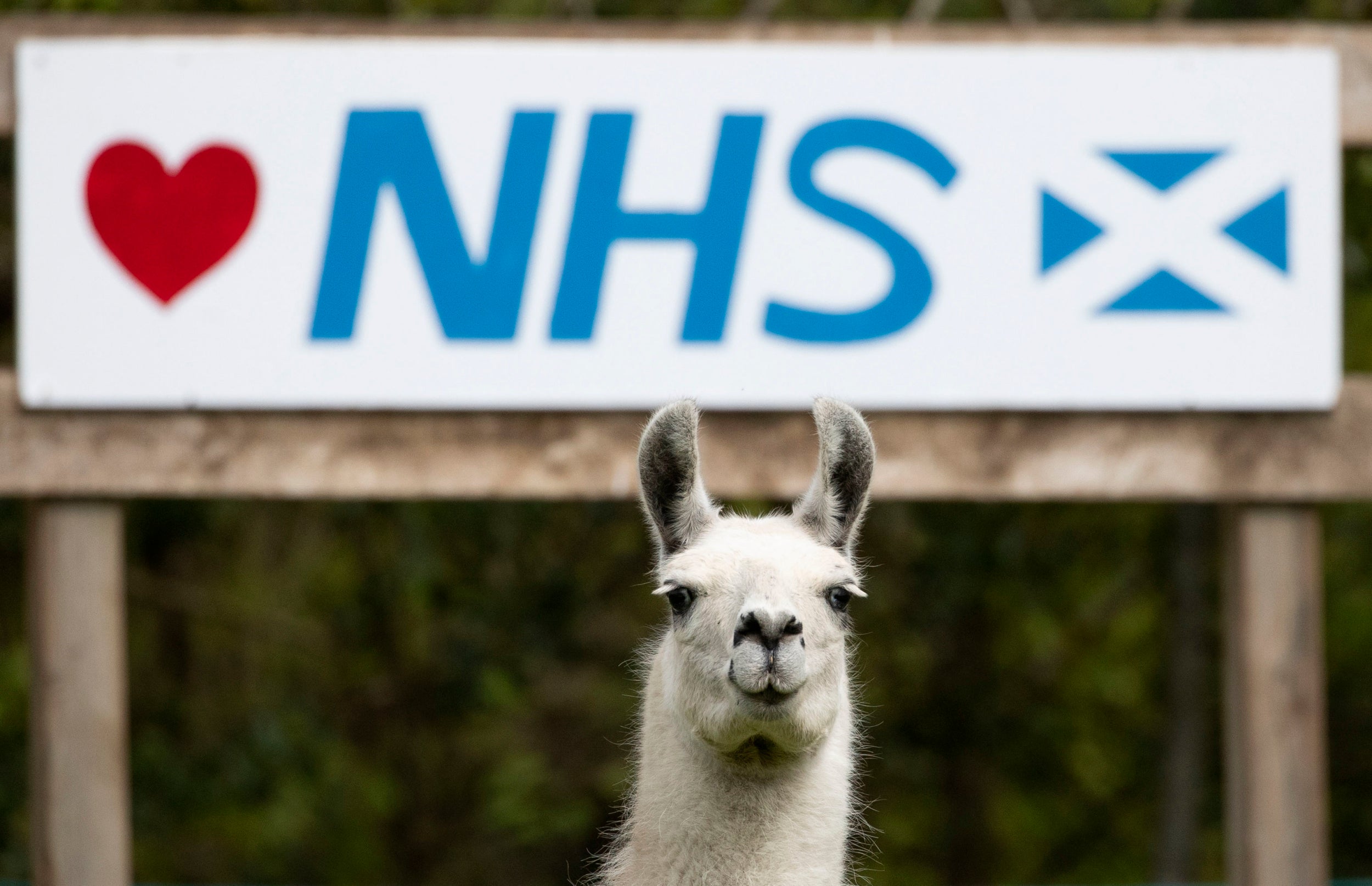
41/50 1 May 2020
Bonnie the Llama grazes in a field in the Scottish Borders alongside a sign supporting the NHS as the UK continues in lockdown
PA
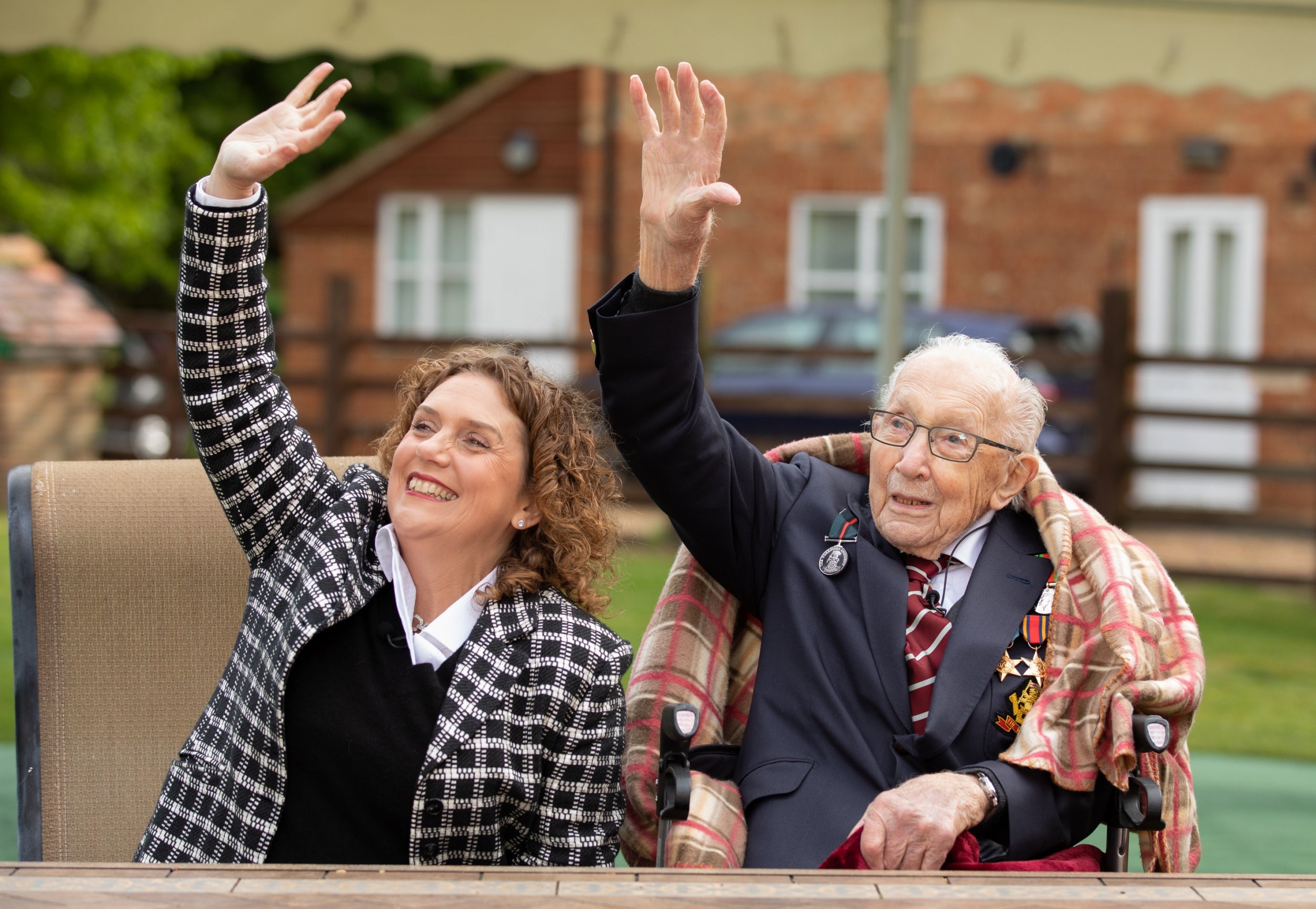
42/50 30 April 2020
Colonel Tom Moore and his daughter Hannah celebrate his 100th birthday, with an RAF flypast provided by a Spitfire and a Hurricane over his home in Marston Moretaine. Colonel Moore, formerly a Captain, received a promotion in honour of his birthday and in recognition of the funds, in excess of £30m, he raised for the NHS by walking laps of his garden
Capture the Light Photography/Getty
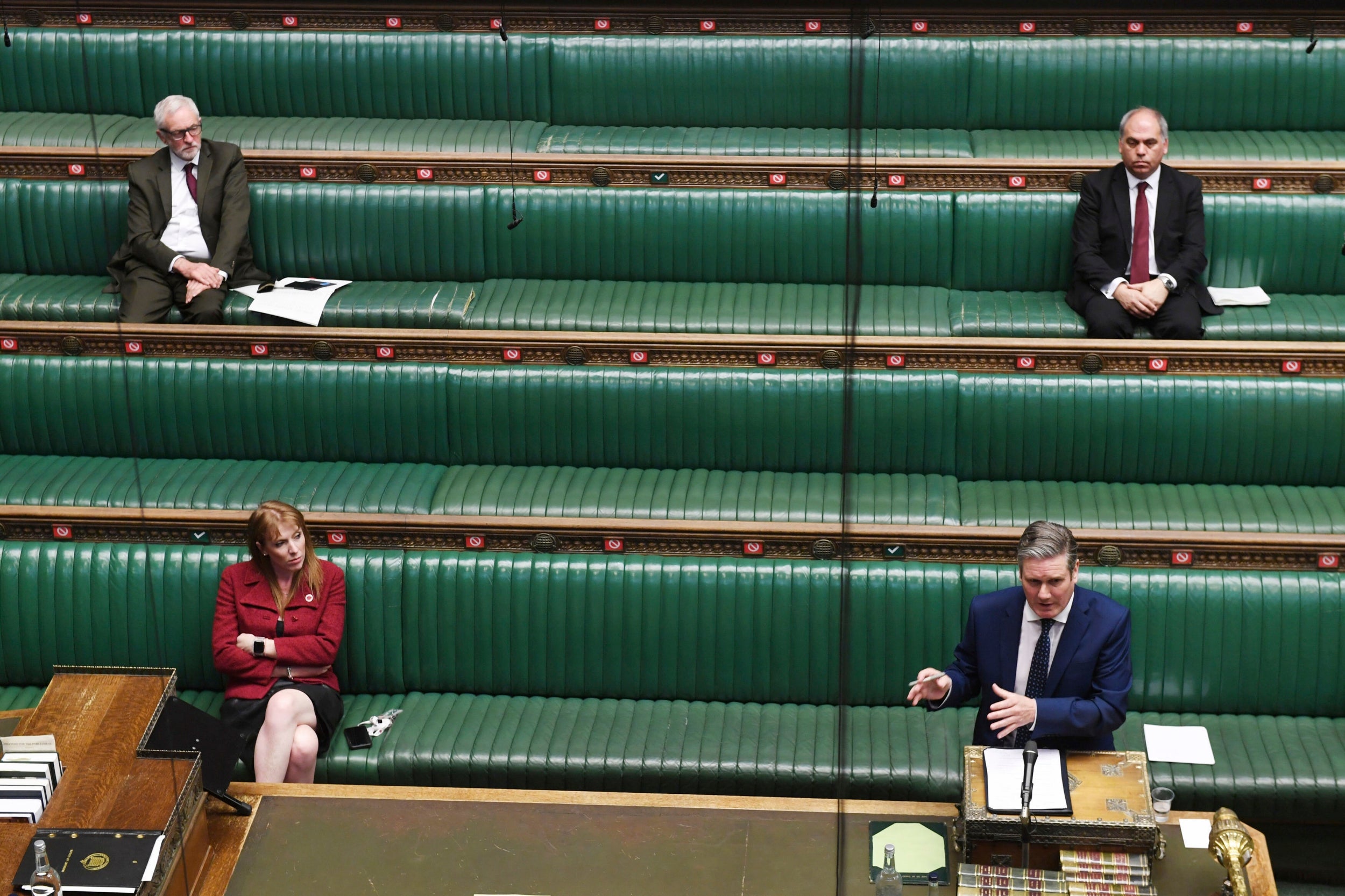
43/50 29 April 2020
Britain’s Labour leader Keir Starmer speaks during Prime Minister’s Questions, as members of Parliament observe social distancing due to the coronavirus, in the House of Commons, London, Wednesday, April 29, 2020
UK Parliament/AP
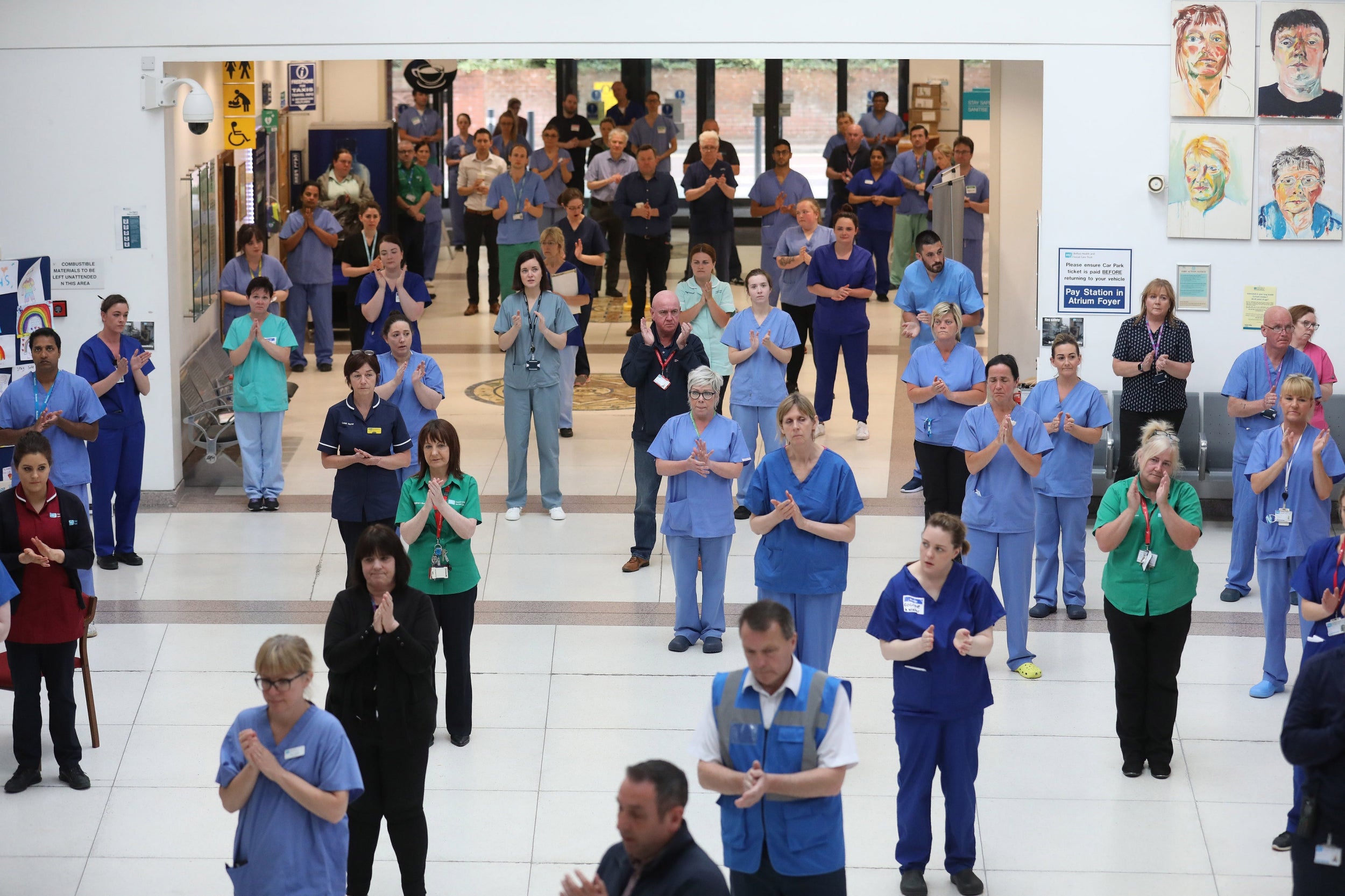
44/50 28 April 2020
NHS staff at the Mater hospital in Belfast, during a minute’s silence to pay tribute to the NHS staff and key workers who have died during the coronavirus outbreak
PA

45/50 27 April 2020
The sun rises behind redundant oil platforms moored in the Firth of Forth near Kirkcaldy, Fife. Global oil prices have crashed after the coronavirus pandemic reduced demand, with analysts warning that the oil majors may be looking at one of their biggest quarter-on-quarter profitability hits in history.
PA
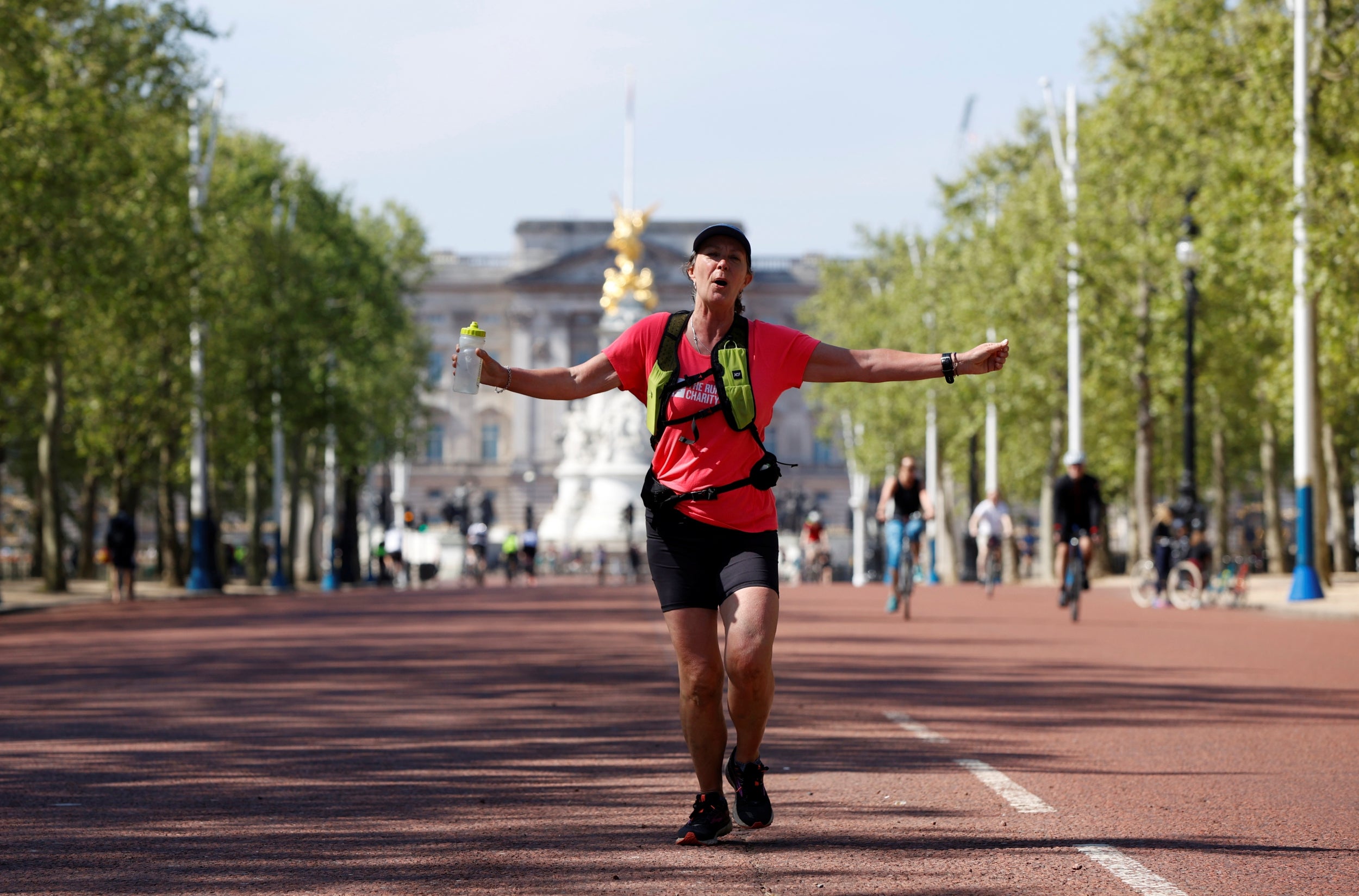
46/50 26 April 2020
Frankie Lynch celebrates on the Mall where the finish of the London Marathon was due to take place today after running 2.6 miles instead of 26 miles to raise money for The Running Charity
Reuters

47/50 25 April 2020
A muslim woman walks past balloons outside the National Hospital for Neurology and Neurosurgery in London
Reuters

48/50 24 April 2020
An empty Brighton Pier, closed during the Coronavirus pandemic as temperatures reach 20 degrees in the South East
Rex
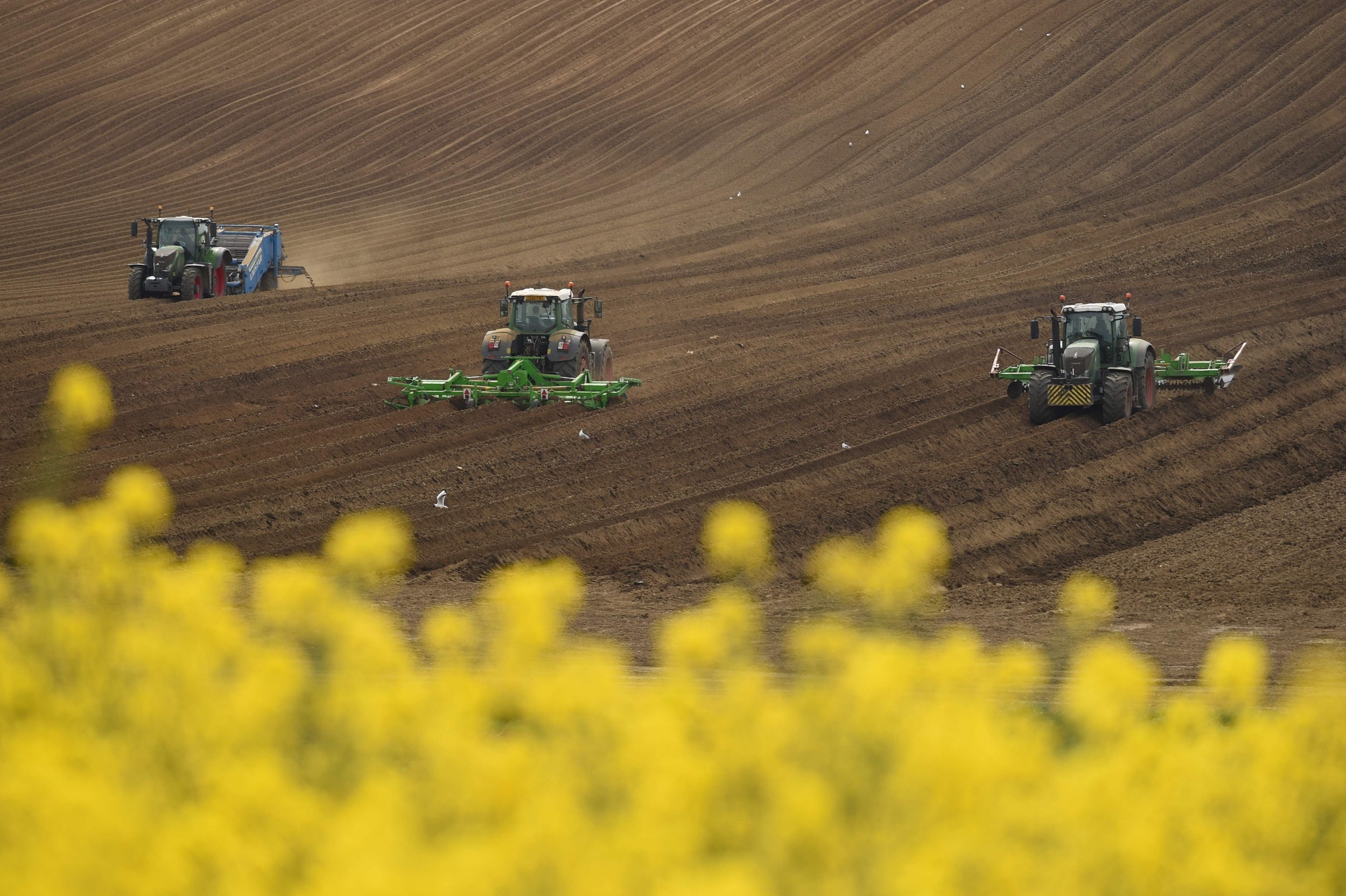
49/50 23 April 2020
Farmers work with vehicles to prepare a field next to a field of flowering rapeseed near Pontefract, West Yorkshire
AFP/Getty

50/50 22 April 2020
The Northern Lights, the Milky Way and a Lyrid meteor at the Bathing House near Howick, Northumberland, as the Lyrid meteor shower reached its peak
PA

1/50 10 June 2020
Social distancing markers around the penguin enclosure at London Zoo. Staff have been preparing and are now ready for reopening next week with new signage, one-way trails for visitors to follow, and extra handwashing and sanitiser stations in place
PA

2/50 9 June 2020
Protestors hold placards and shout slogans during during a protest called by the Rhodes Must Fall campaign calling for the removal of the statue of British imperialist Cecil John Rhodes outside Oriel College, at the University of Oxford
AFP via Getty

3/50 8 June 2020
Hermione Wilson helps to install a new artwork at Jupiter Artland, Edinburgh, created as a tribute to the NHS titled “A Thousand Thank Yous” originally devised by the late Allan Kaprow which consists of colourful painted messages on cardboard and has been directed remotely by London-based artist Peter Liversidge
PA

4/50 7 June 2020
The Edward Colston statue has been pulled down by Black Lives Matter protesters in Bristol. Colston was a 17th century slave trader who has numerous landmarks named after him in Bristol
SWNS

5/50 6 June 2020
Children pose for their family in front of discarded placards fixed on a wall in Piccadilly Gardens after a Black Lives Matter demonstrations in Manchester. The death of an African-American man, George Floyd, while in the custody of Minneapolis police has sparked protests across the United States, as well as demonstrations of solidarity in many countries around the world
Getty

6/50 5 June 2020
Protesters kneel in Trafalgar Square during a Black Lives Matter demonstration in London, England. The death of an African-American man, George Floyd, while in the custody of Minneapolis police has sparked protests across the United States, as well as demonstrations of solidarity in many countries around the world
Getty

7/50 4 June 2020
Protestors march from Windsor Castle in solidarity with the Black Lives Matter movement
Getty

8/50 3 June 2020
People wearing face masks hold banners in Hyde Park during a Black Lives Matter protest following the death of George Floyd who died in police custody in Minneapolis
Reuters

9/50 2 June 2020
Street artist Nath Murdoch touches up his anti-racism mural in Peterborough, Cambridgeshire
PA

10/50 1 June 2020
Customers socially distance themselves as they queue to enter Ikea in Warrington. The store opening saw large queues of people and traffic on adjacent roads as it reopened after the lockdown. The furniture and housewares chain reopened its stores across England and Northern Ireland subject to several restrictions, keeping its restaurants closed and asking customers to shop alone
Getty

11/50 31 May 2020
A man wearing a protective face mask kneels in front of police officers during a protest against the death in Minneapolis police custody of African-American man George Floyd near the U.S. Embassy, London, Britai
Reuters

12/50 30 May 2020
Visitors at Grassholme Reservoir in Lunedale, Co Durham are able to cross an ancient packhorse bridge as work on the dam wall means water levels have dropped signifcantly to reveal this monument of the pas
UK

13/50 29 May 2020
British Tennis player Maia Lumsden in action at Bridge of Allan Tennis Club. People can meet family and friends outdoors and play sports such as golf and tennis again as the country is moving into phase one of the Scottish Government’s plan for gradually lifting lockdown
PA

14/50 28 May 2020
A police frogman, searches for a weapon in Abington Lake in in Northampton
Getty

15/50 27 May 2020
Prime Minister Boris Johnson appears before the Liaison Committee via Zoom from the cabinet room at 10 Downing Street, amid the coronavirus
10 Downing Street/Reuters

16/50 26 May 2020
Members of the public relax on the beach at Botany Bay in Margate
Getty

17/50 25 May 2020
Dominic Cummings, senior aide to Prime Minister Boris Johnson, makes a statement inside 10 Downing Street, London, over allegations he breached coronavirus lockdown restrictions
AP

18/50 24 May 2020
A demonstrator holds a sign reading ‘Why are you above the law?’ outside the house of Dominic Cummings in London, following allegations Cummings broke coronavirus lockdown rules by travelling across the country
Reuters

19/50 23 May 2020
People take a walk near Durdle Door as cows graze in Lulworth
Reuters

20/50 22 May 2020
Waves break onto a wall at Brighton beach
Reuters

21/50 21 May 2020
Cafe owner Francini Osorio serves customers in a trial phase during the coronavirus lockdown. Osorio has installed an air purifier and 35 clear shower curtains, which will divide customers and tables, in the Francini Cafe De Colombia, Worcester, ready for the re-opening of his business as lockdown restrictions are eased
PA

22/50 20 May 2020
People at Bournemouth beach in Dorset, as people flock to parks and beaches with lockdown measures eased. The Met Office has predicted the hottest day of the year
PA

23/50 19 May 2020
A dog jumps into the water as families relax at a Lido in London
AP

24/50 18 May 2020
A fan celebrates outside Celtic Park after Celtic were crowned champions of the Scottish Premiership. Hearts were also relegated after a decision was made to conclude the season with immediate effect
PA

25/50 17 May 2020
People on Brighton beach after the introduction of measures to bring the country out of lockdown
PA

26/50 16 May 2020
Police lead away Piers Corbyn, brother of former Labour leader Jeremy Corbyn, as protesters gather in breach of lockdown rules in Hyde Park in London after the introduction of measures to bring the country out of lockdown.
PA

27/50 15 May 2020
Estonian freelance ballet dancer and choreographer, Eve Mutso performs her daily fitness routine near her home in Glasgow, Scotland
Getty

28/50 14 May 2020
Senior charge nurse Jan Ferguson views artwork “Theatre of Dott’s” by Kate Ive, inspired by Professor Norman Dott and his neurosurgery theatres at the Western General from 1960-2019. It is one of a number of artworks which sit on the walls of NHS Lothians’ Department of Clinical Neurosciences (DCN) which has been transferred into a purpose-built new home on the Little France campus in Edinburgh
PA

29/50 13 May 2020
Team GB’s karate athlete Jordan Thomas trains outside his apartment in Manchester
Reuters

30/50 12 May 2020
Nurses from central London hospitals protest on international nurses day about the chronic underfunding of the NHS and other issues surrounding the health service outside the gates of Downing Street, London
PA

31/50 11 May 2020
Waves crash at Tynemouth pier on the North East coast
PA

32/50 10 May 2020
A woman passes street art and a poster in East London
Reuters

33/50 9 May 2020
Police patrol the beach in Brighton
Getty

34/50 8 May 2020
The British Royal Air Force Red Arrows conduct a fly past over the statue of former British Prime Minister Winston Churchill in London to commemorate the 75th Anniversary of Victory in Europe (VE Day) in Britain
MOD/Reuters

35/50 7 May 2020
Team GB sailor Eilidh McIntyre during a training session at her home in Portsmouth
Reuters

36/50 6 May 2020
Labour Party leader Keir Starmer listens to Prime Minister Boris Johnson speaking during PMQs
UK Parliament/AFP/Getty

37/50 5 May 2020
The sun appears to explode over the horizon in this montage of images captured by photographer Nick Lucas near his home in Ringwood, Hampshire. Nick took a number of pictures just a few seconds apart on a tripod mounted camera which were then combined to give the eye catching dawn image
Nick Lucas/SWNS

38/50 4 May 2020
Leeds Green Watch firefighters observe a minute’s silence outside the fire station in Kirkstall Rd, in memory their colleagues that lost their lives in the line of duty
PA

39/50 3 May 2020
Staff at The Berkeley hotel give food to ambulance workers
Reuters

40/50 2 May 2020
One of a small group of anti-lockdown protesters speaks to a police officer as they gather outside New Scotland Yard in Victoria, London
AFP via Getty

41/50 1 May 2020
Bonnie the Llama grazes in a field in the Scottish Borders alongside a sign supporting the NHS as the UK continues in lockdown
PA

42/50 30 April 2020
Colonel Tom Moore and his daughter Hannah celebrate his 100th birthday, with an RAF flypast provided by a Spitfire and a Hurricane over his home in Marston Moretaine. Colonel Moore, formerly a Captain, received a promotion in honour of his birthday and in recognition of the funds, in excess of £30m, he raised for the NHS by walking laps of his garden
Capture the Light Photography/Getty

43/50 29 April 2020
Britain’s Labour leader Keir Starmer speaks during Prime Minister’s Questions, as members of Parliament observe social distancing due to the coronavirus, in the House of Commons, London, Wednesday, April 29, 2020
UK Parliament/AP

44/50 28 April 2020
NHS staff at the Mater hospital in Belfast, during a minute’s silence to pay tribute to the NHS staff and key workers who have died during the coronavirus outbreak
PA

45/50 27 April 2020
The sun rises behind redundant oil platforms moored in the Firth of Forth near Kirkcaldy, Fife. Global oil prices have crashed after the coronavirus pandemic reduced demand, with analysts warning that the oil majors may be looking at one of their biggest quarter-on-quarter profitability hits in history.
PA

46/50 26 April 2020
Frankie Lynch celebrates on the Mall where the finish of the London Marathon was due to take place today after running 2.6 miles instead of 26 miles to raise money for The Running Charity
Reuters

47/50 25 April 2020
A muslim woman walks past balloons outside the National Hospital for Neurology and Neurosurgery in London
Reuters

48/50 24 April 2020
An empty Brighton Pier, closed during the Coronavirus pandemic as temperatures reach 20 degrees in the South East
Rex

49/50 23 April 2020
Farmers work with vehicles to prepare a field next to a field of flowering rapeseed near Pontefract, West Yorkshire
AFP/Getty

50/50 22 April 2020
The Northern Lights, the Milky Way and a Lyrid meteor at the Bathing House near Howick, Northumberland, as the Lyrid meteor shower reached its peak
PA
A government spokesperson said: “We are pleased the commission recognises progress in areas such as improving life chances for poorer groups, boosting mental health support for young people, and keeping disadvantaged pupils in education for longer.
“We remain committed to levelling up opportunity across the country, and continue to do all we can to make sure no-one is left behind as a result of coronavirus.
“From the start of the outbreak, all vulnerable children have been able to attend school and we have provided over £100m to support children to learn at home. We also continue to invest significantly in schools and early years, alongside raising wages and increasing work incentives for the lowest paid families.”



